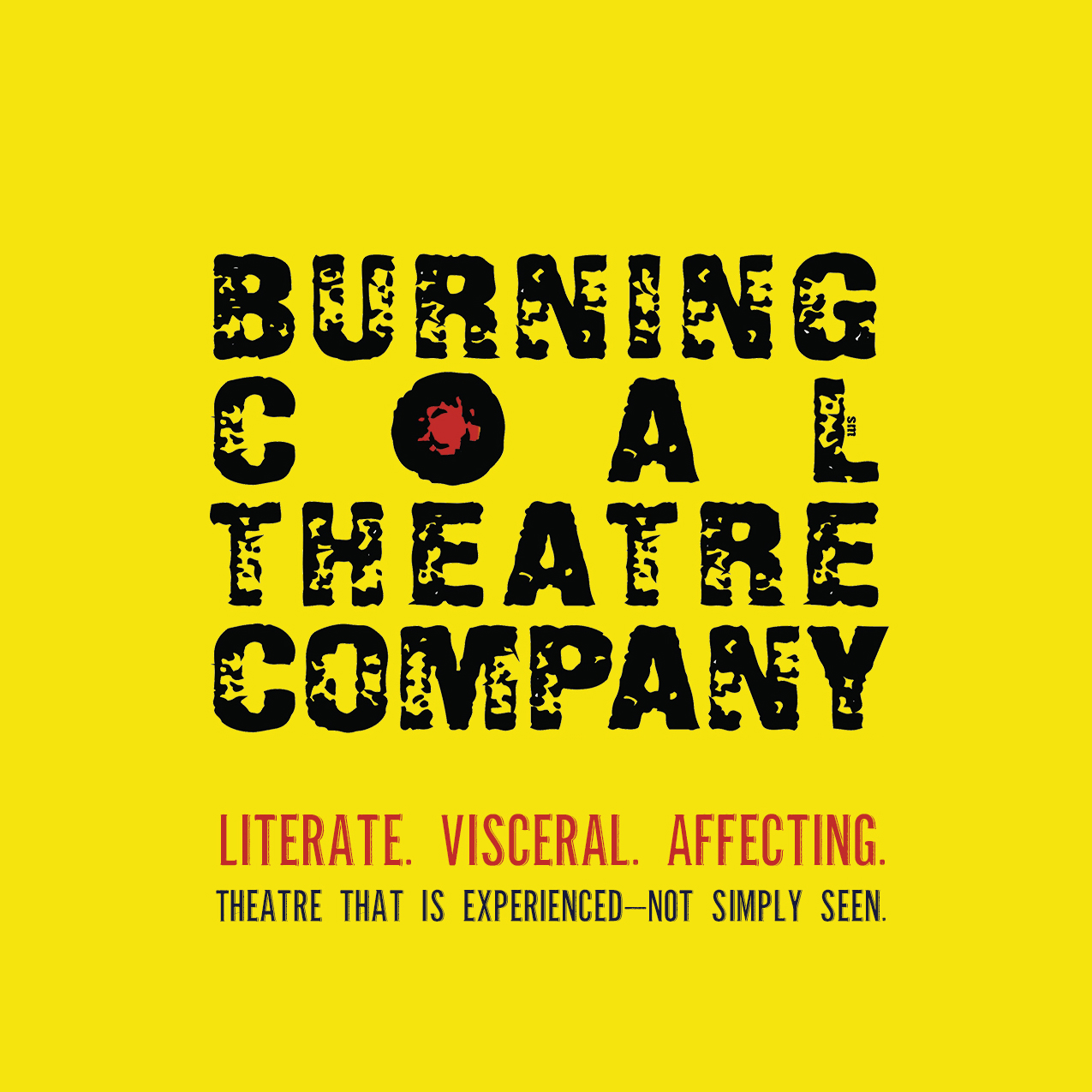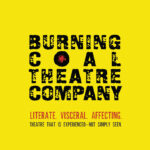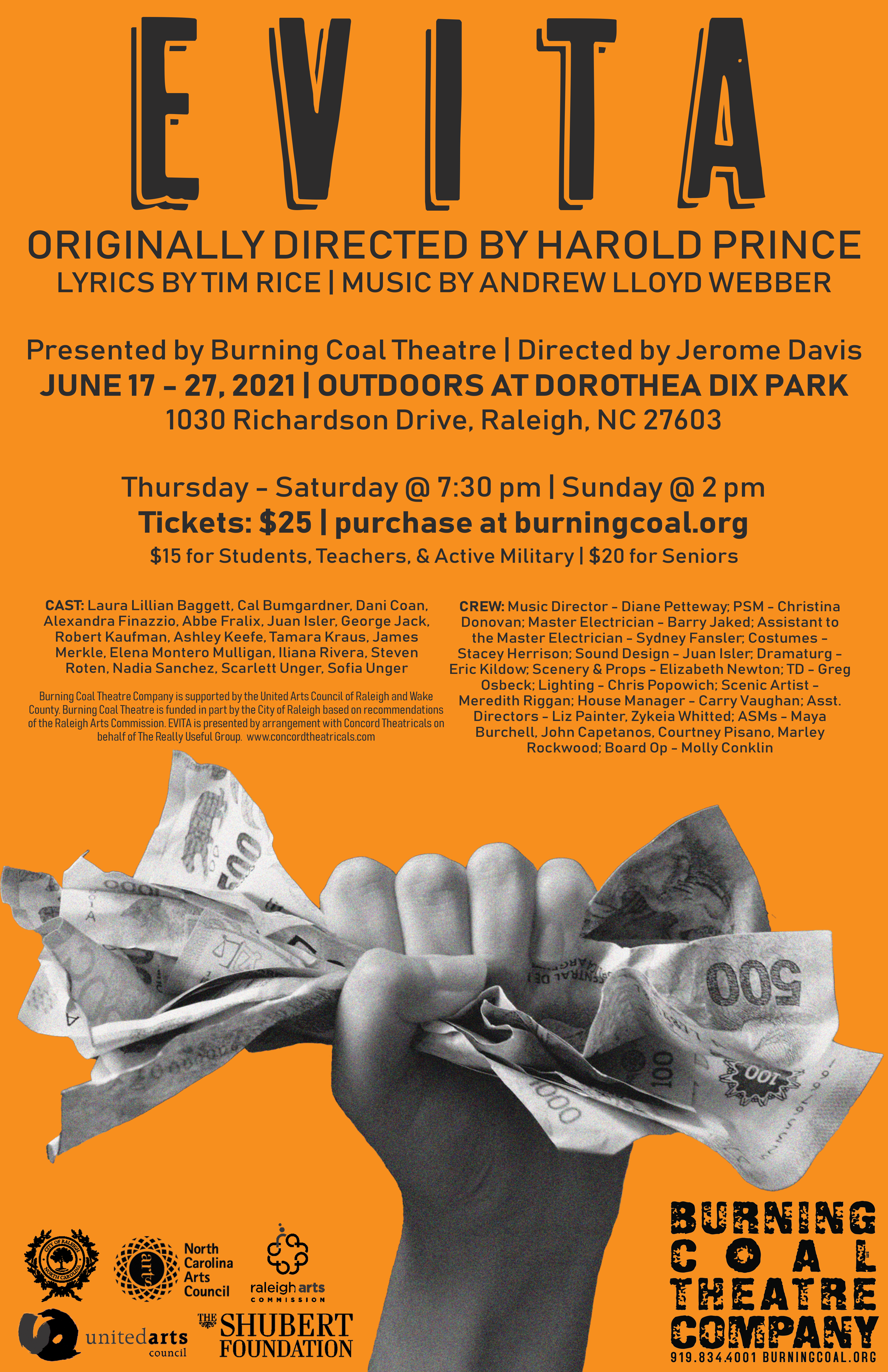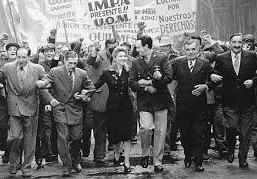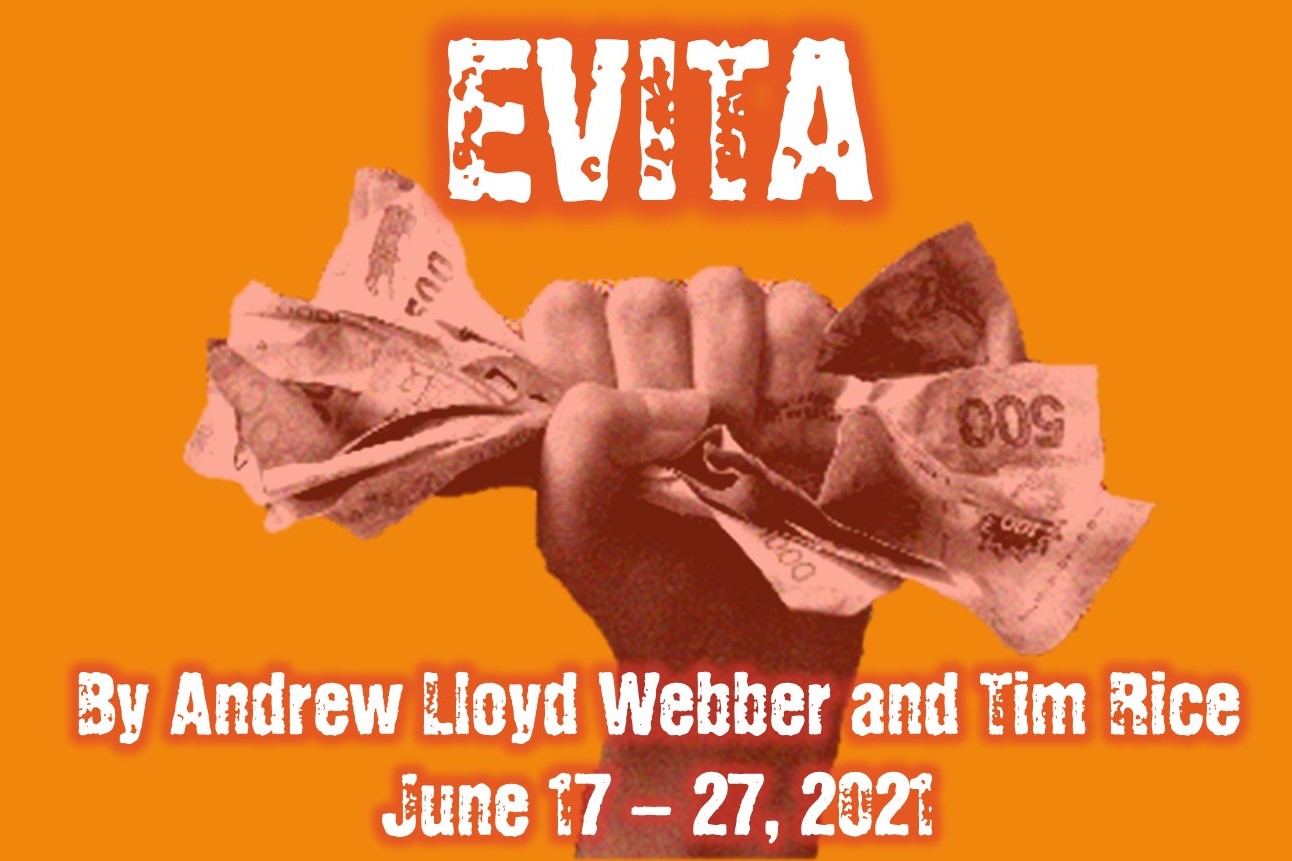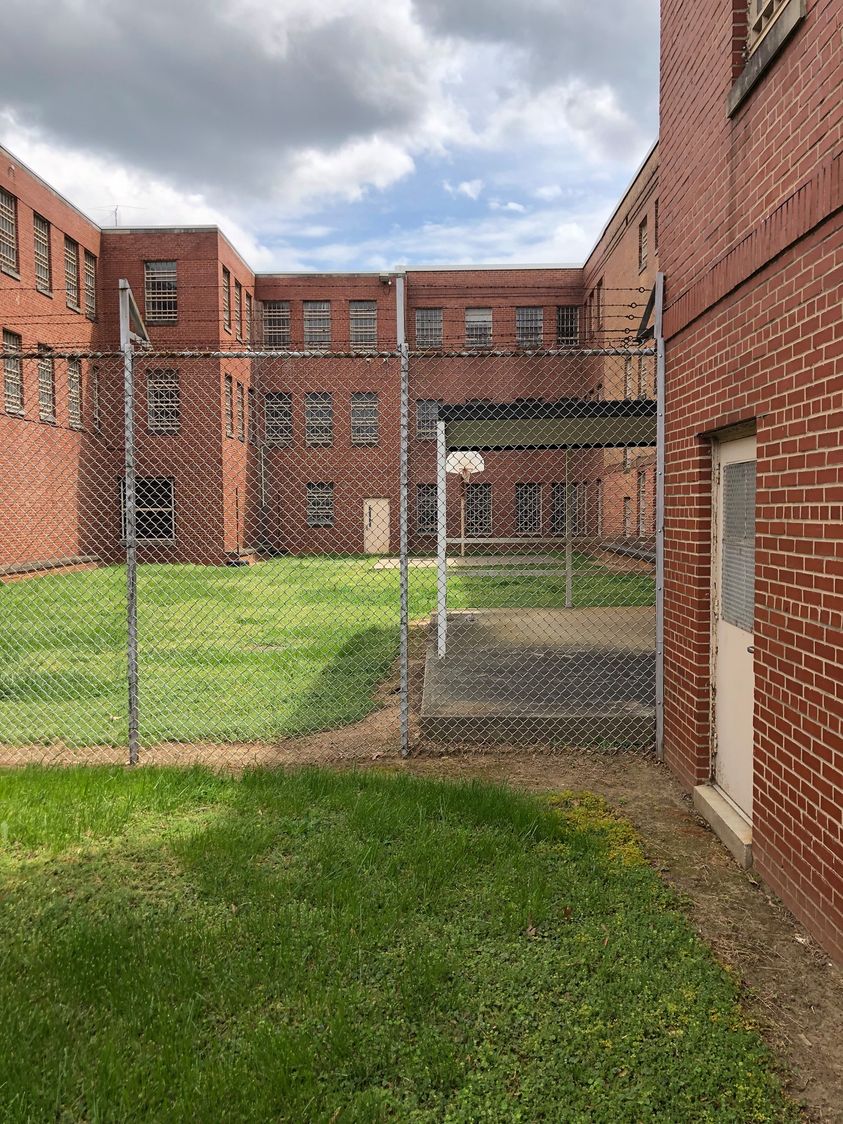
Through the Years Timeline:
Season 20: (2016-2017)
Skylight
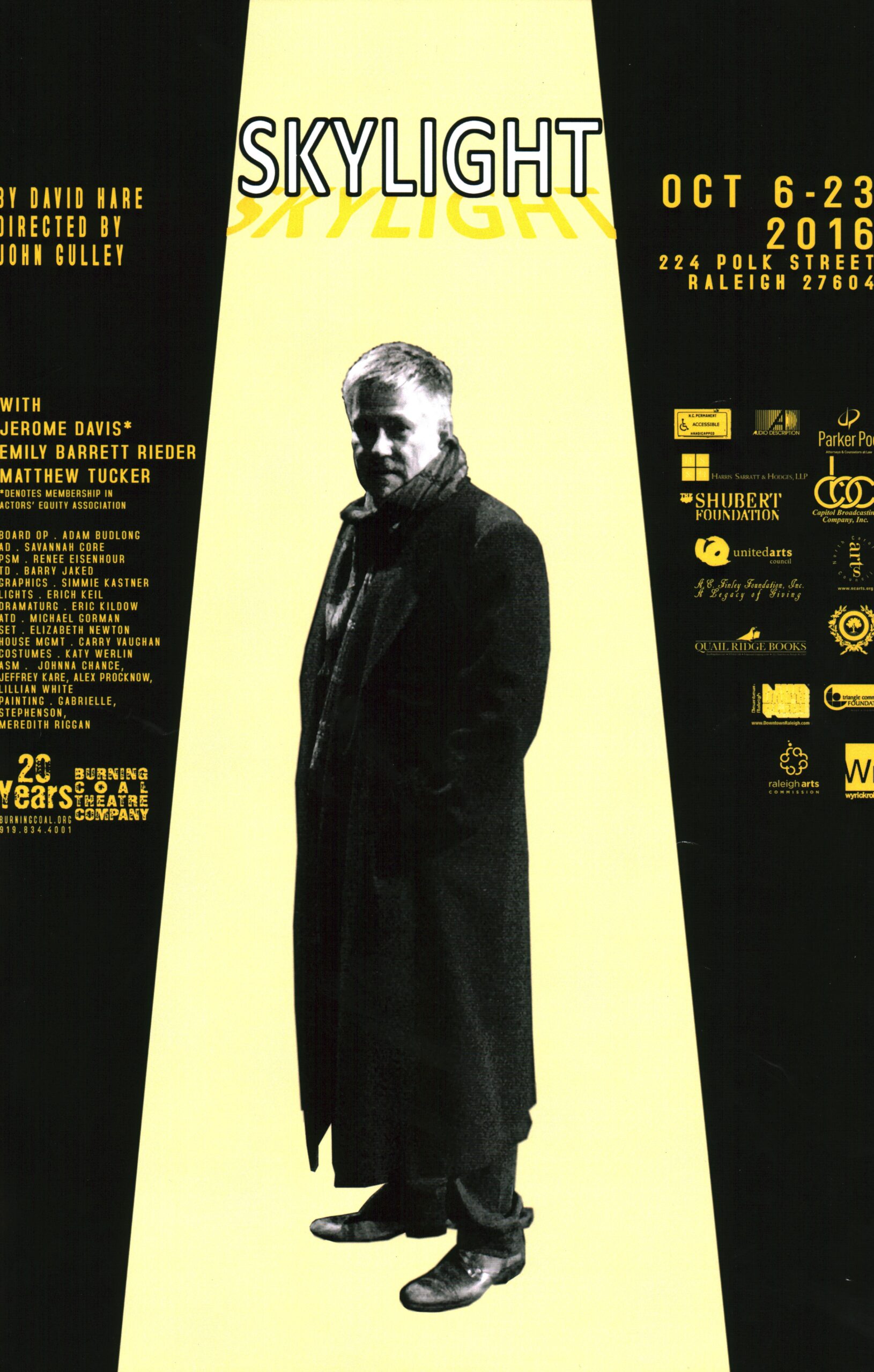
Skylight by David Hare
Dir. John Gulley
Dates: Oct. 6-23, 2016
Location: Murphey School
Written on the Heart
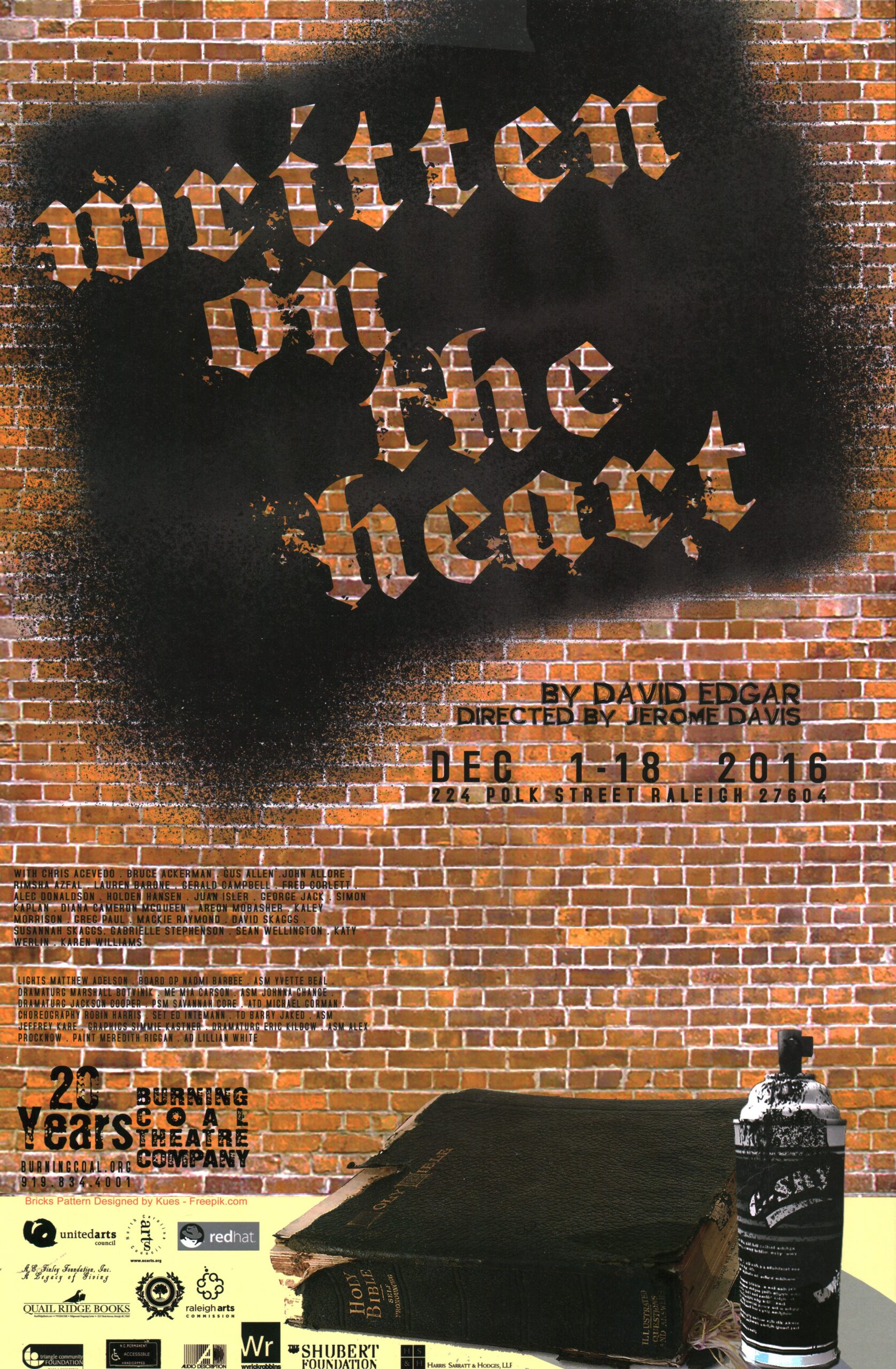
Written on the Heart by David Edgar
Dir. Jerome Davis
Dates: December 1-18, 2016
Location: Murphey School
Heisenberg: A Love Story
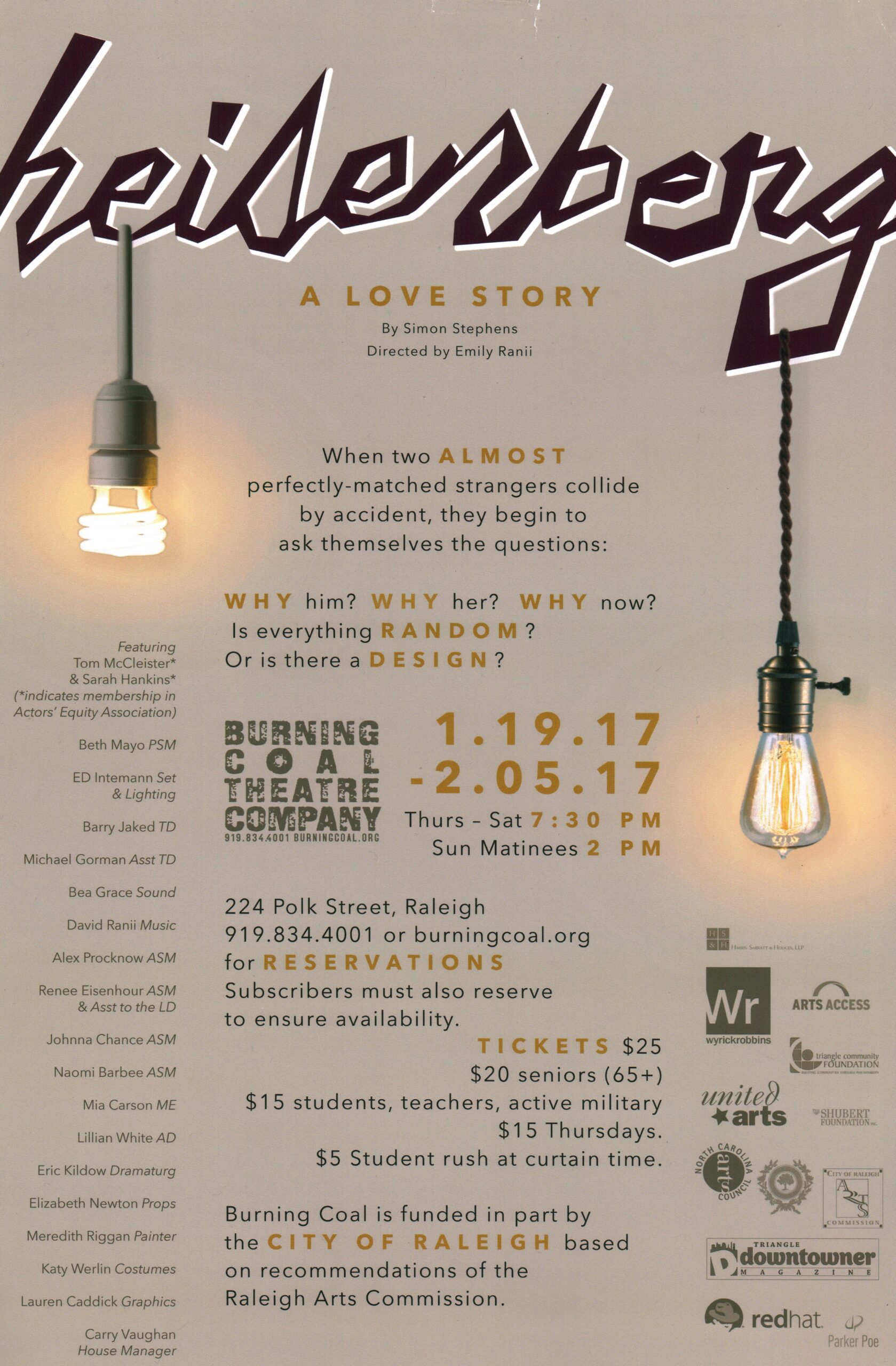
Heisenberg: A Love Story by Simon Stephens
Dir. Emily Ranii
Dates: January 19- February 5, 2017
Location: Murphey School
The Royale
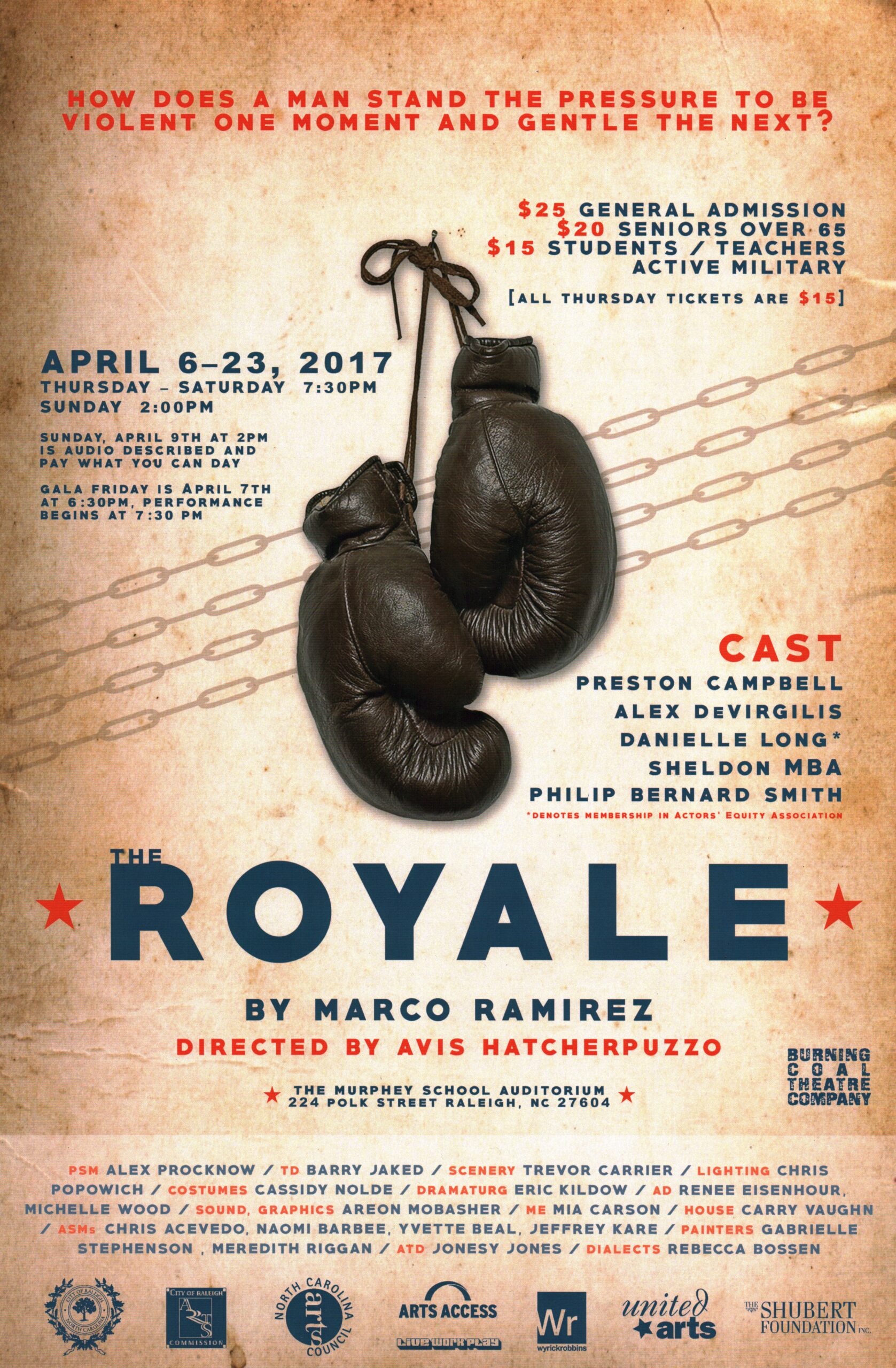
THE ROYALE by Marco Ramirez
Dir. Avis Hatcherpuzzo
Dates: April 6-23, 2017
Location: Murphey School
Skylight
Skylight by David Hare
Dir. John Gulley
Dates: Oct. 6-23, 2016
Location: Murphey School
Artistic Director’s Notes:
Somehow, with round numbers, there is a sense of celebration. “We made it to 20! Let us know look back and see what we have accomplished.” But those events are also opportunities to gaze into the future. “What comes next?”
I don’t know about you, but I’m getting a little frightened for our country. More frequently, I am seeing a government that hedges its bets against the wellbeing of the people it is supposed to be protecting, a media that willfully casts its gaze way from critical issues in favor of the monied (as well as geographic) elites, a church that serves the SUV crowd by serving up, not the teachings of its formidable and ancient doctrines, but the pabulum most likely to keep ’em coming back, and finally, a listless “people” who, can manage but a collective sigh whenever another opportunity trickles past. The four estates are in shambles.
I wanted to open with Skylight, a play that I’ve loved for 20+ years, because it is a play about all of those things. It is a play about two people who love each other dearly, but have trouble agreeing with one another. Is it saying that people don’t need to agree in order to be compatible? Perhaps… but I also think it is about how little we allow ourselves to hear arguments that oppose ours. How often do we sequester ourselves in enclaves of similarity, refusing to consider any argument but the ones that we (all too often) have only loosely formulated?
There’s a reason why Hare’s great play (in my opinion as well as others) has not be successfully transferred to film. The tension in the play comes not only from the two central characters’ determination to be heard, but from the playwright’s determination to make the audience hear. The final ‘character’ in the play is the audience. It isn’t “direct address” (as we say in the business), meaning the actors never talk to the audience… but they do. How they do. And in this autumn of the year 2016, there is no greater achievement, I think, than to get ideas in front of the public. Big ideas. David Hare has done that. We and, especially, I am very proud to open our 20th season with this work.
So, then, back to the question: where do we go from here? The answer is in the moment when the actors begin to speak… but mostly it is in the moment when we allow ourselves to hear. Is that far-fetched possibility? If it is, then I’m in the wrong business.
Jerome Davis
Crew:
Stage Manager: E. Renee Eisenhour
Technical Direction: Barry Jaked
Scene and Props Design: Elizabeth Newton
Lighting Design: Erich Keil
Costume Design: Katy Werlin
Sound Design: Steve Burnett
Study Guides: Eric Kildow
Graphics Design: Simmie Kastner
Assistant Stage Managers: Johanna Chance, Jeffery Kare, Lillian White
Assistant Director: Savannah Core
Master Electrician: Mia Carson
Scenic Artists: Meredith Riggan, Gabrielle Stephenson
Assistant TD: Michael Gorman
Dialects Coach: Rebecca Bossen
Board Op: Adam Budlong
House Manager: Carry Vaughan
Cast:
Emily Barrett Rieder- Kyra Hollis
Matthew Tucker- Edward Sergeant
Jerome Davis- Tom Sergeant
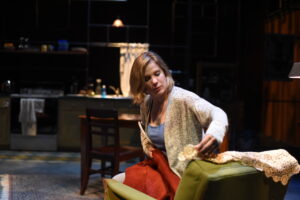
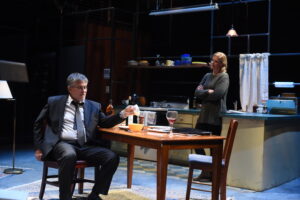
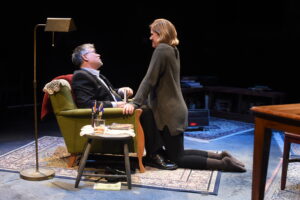
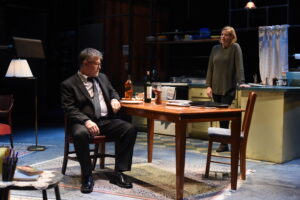
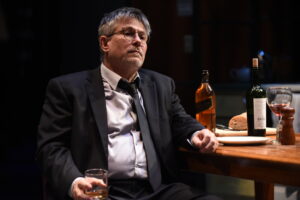
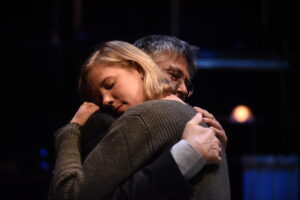
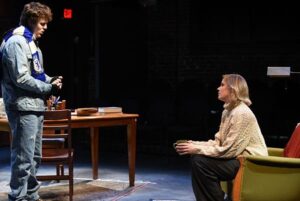
Have a fond or interesting memory of this play you’d like to share with us? We’d love to hear it!
Please Contact Us to Share!
Burning Coal Theatre
(919) 834-4001
224 Polk St., Raleigh NC 27604
Played October 6-23, Skylight
Written on the Heart
Written on the Heart by David Edgar
Dir. Jerome Davis
Dates: December 1-18, 2016
Location: Murphey School
Artistic Director’s Notes:
Happy holidays from Burning Coal. Each year we repeat ourselves, slogging through the same
rituals of faith and family, sometimes joyously, sometimes out of a sense of commitment. Why
do we do it? Because we’ve always done it. There is something comforting in ritual, I suppose.
Elections can feel that way. Too. Every time we have an election season in our country I hear
many otherwise thoughtful people saying “my vote won’t matter”…
With that in mind, I was
thinking this might be a good time to look at David Edgar’s play about the approximately 80
year process that led to the publication of the King James Bible in 1611.
What a remarkable story
it is, with its heretics, scheming Bishops, aloof royals and in the middle of it all, one man firmly
committed to an idea. And then I think of the hinge moments in history, moments in which
civilization could have swung one way but instead went another, moments like the time when a man named William Tyndale, a wealthy Oxford and Cambridge man, decided for himself that
“ploughboys” should be able to read the word of God – that the church, any church, was wrong to
claim exclusive understanding of God’s word. Tyndale was willing to work, to raise his head up, to walk into the fire in order to accomplish what he believed to be necessary for civilization to progress.
The problem with that idea, of course, is that it requires that the determined person also
be a good and wise person – and the money doesn’t hurt either! When one begins to delve into
history’s hinge moments, one often discovers that, low and behold the mover, the shaker, is just as flawed as the rest of us. And sometimes, more so. And so was the case with Tyndale. He had prejudices just as troubling as any of the lesser folk with bios that won’t merit a Wikipedia page.
David Edgar has said that he prefers to write about history’s losers.The people who, when the smoke cleared (often literally so), were left on the outside, looking in.
Written on the Heart, then, is an exception to David’s work to the extent that it is about a man, Tyndale, who ultimately
won. The Powerful Elites (in this case, Church and State), colluding (when did that ever happen?!), were determined to create in the King James Version of the Bible a pacifier,
something that would stop the brutal wars being fought between the Puritans and the more
catholic-oriented Church of England during the reigns of Henry VIII, Edward, Mary (the
Catholic champion), and her sister, Elizabeth I, who was inclined toward the Protestant view.
Let the revolution proceed “thus far, but no further!” Edgar suggests this might have been the motto of those working quietly, behind the scenes, to orchestrate the creation of the KJB.
But while using much of the 80 year old translation written by a church-declared Heretic, William Tyndale, they failed to take into account the very idea upon which Tyndale had done his work namely that to the People must ultimately go the Power. And when the Power was in the hands of the People, in the form of understanding, it was little more than one generation before they
rose up and dethroned a corrupt King, Charles I.
No, history never repeats itself.
Jerome Davis
Crew:
Choreography: Robin Harris
Vocal Arrangements: Ted Oliver and Julie Oliver
Stage Manager: Savannah Core
Technical Director: Barry Jaked
Scenery: ED Intemann
Props: Elizabeth Newton
Lighting Design: Matthew Adelson
Costume Design: Katy Werlin
Sound Design: Christopher Thurston
Singing Coach: Julie Oliver
Study Guide: Eric Kildow
Dramaturg: Marshall Botvinik and Jackson Cooper
Graphics Design: Simmie Kastner
Asst. Choreographer: Avis Hatcher-Puzzo
Asst. Stage Manager: Yvette Beal, Johnna Chance, Jeffrey Kare, Alex Procknow
Asst. Director: Lillian White
Master Electrician: Mia Carson
Scenic Artists: Meredith Riggan and Jen Leiner
Asst. Technical Director: Michael Gorman
Flemish Coach: Simon Kaplan
Board Operator: Naomi Barbee
House Manager: Carry Vaughan
Cast:
Chris Acevedo – Clerk
Bruce Ackerman – George Abbot, Bishop of London
Gus Allen – Samuel Ward, a Scholar
John Allore – William Tyndale
Rimsha Azfal – A Lady
Laren Barone – William Laud
Gerald Campbell – A Painter/A Lord
Fred Corlett – John Overall, the Dean of St. Paul’s
Alec Donaldson – Sir Henry Saville, of Oxford/Lord
Holden Hansen – Richard Thompson, a Scholar
Juan Isler – A Flemish Prison Keeper
George Jack – Lancelot Andrewes, the Bishop of Ely
Simon Kaplan – Laurence Chaderton, Emmanuel College/Archdeacon
Diana Cameron McQueen – Lady Alletta Carey
Areon Mobasher – Young Andrewes
Kaley Morrison – Mary Currer
Greg Paul – Workman/Churchwarden/A Lord
Mackie Raymond – Sir John Harington, a Courtier
David Skaggs – Henry, Prince of Wales
Gabrielle Stephenson – A Lady
Sean Wellington – A Young Catholic Priest
Katy Werlin – Lady of the Manor/A Lady
Karen Morgan Williams – A Lady
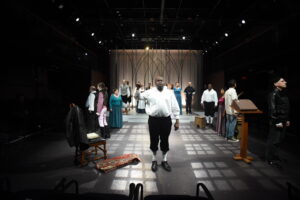
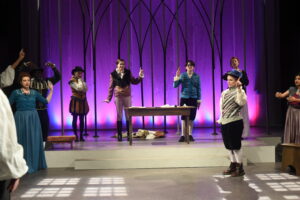
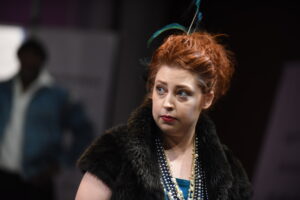
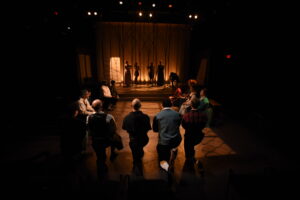

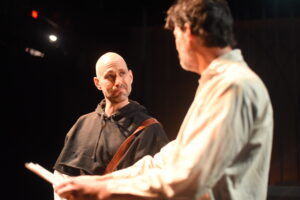
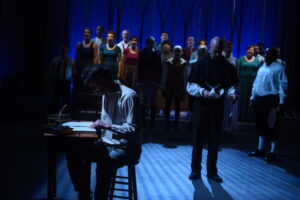
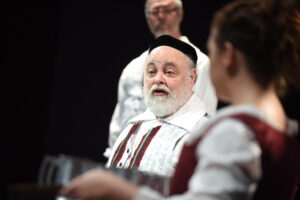
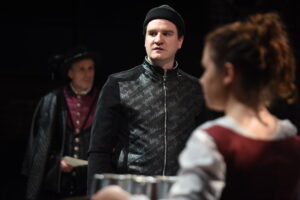
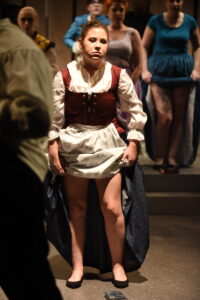
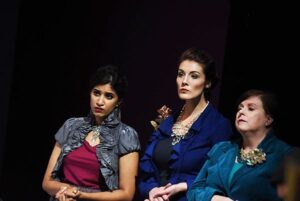
Have a fond or interesting memory of this play you’d like to share with us? We’d love to hear it!
Please Contact Us to Share!
Burning Coal Theatre
(919) 834-4001
224 Polk St., Raleigh NC 27604
Played December 1-18, Written on the Heart
Heisenberg: A Love Story
Heisenberg: A Love Story by Simon Stephens
Dir. Emily Ranii
Dates: January 19- February 5, 2017
Location: Murphey School
Artistic Director’s Notes:
My mom was (and is) fond of beseeching me to “sit still!”, to stop feeling that I always had to be
doing something. As a child, I assumed she was saying those things because she wanted me less present in her life.
Heisenberg’s Uncertainty Principle suggests that the more thoroughly we know the velocity of
an object, the less thoroughly can we know that same object’s position.
Simon Stephens always seems to be writing plays that are built upon this idea. From the young man on the autism
spectrum at the heart of the Curious Incident of the Dog in the Nighttime or the confused and
willful landowners in The Cherry Orchard (two of his more recent adaptations) to the rowdy
school boys of Punk Rock and the emotionally disoriented in Pornography (about the 7/7 London Underground bombing) to the quiet, internal anguish of the father speaking of an
unspeakable tragedy in Sea Wall, Stephens’ characters are all a bit untethered to the reality of the moment. They seem each in some way to be clinging desperately to a world that no longer exists, or that is falling out from under their feet. Uncertainty surrounds them, yet they strive for the comforts of the past.
I think in the year 2017 we are all feeling a bit this way. Many of the institutions that have
allowed mankind the belief that it was progressing have begun to shake. Hard. Like an aging
Hippy who should have long ago realized that the pony tail is no longer working (!), we continue
to look in the mirror and see not the real story but the narrative that we need in order to carry on.
We are in a box (like Schrodinger’ss Cat) and we dare not come out because if we do we may
discover that we never existed at all–or rather that the parts of ourselves that we thought were
most true never existed.
One glaring example of this is the recent report on Seal Team 6, the
group responsible for killing Osama bin Laden. The damning report on their ongoing tactics
makes anyone with eyes, ears and heart reconsider their “heroics,” to say the least. But the mainstream media, one of the more obvious examples of an institution on shaky ground, buried the story so thoroughly that very few people saw it. Maybe we keep watching those news sources because we cannot bear to look at reality.
In Heisenberg, we see two characters who are each dangling from the shredded ends of their
respective rope, clinging and hoping for a soft landing. The extent to which they find it in one
another, makes this play one of the happy surprises of Mr. Stephens’ still relatively young
though remarkably prolific career. In it, the generally pretty cantankerous Mr. Stephens genuinely seems to be saying, “Forget about velocity and concentrate on position.”
Or as Tom Stoppard puts it in one of his recent plays, “Are you telling me that the secret to the Universe is what my mother used to scream at me up the stairs!?
Mom, as usual, was right.
Jerome Davis
Crew:
Stage Manager: Beth Mayo
Technical Director: Barry Jaked
Props Design: Elizabeth Newton
Lighting and Scenic Design: Katy Werlin
Sound Design: Beatriz Wright
Music Design: David Ranii
Study Guide: Eric Kildow
Graphics Design: Lauren Caddick
Asst. Stage Managers: Naomi Barbee, Renee Eisenhour, Alex Procknow
Asst. Technical Director: Ainex Carmona and Michael Gorman
Master Electrician: Mia Carson
Scenic Artists: Meredith Riggan
Tango Choreographer: Mikaela Saccoccio
House Manager: Carry Vaughan
Cast:
Sarah Hankins – Georgie Burns
Tom McCleister – Alex Priest
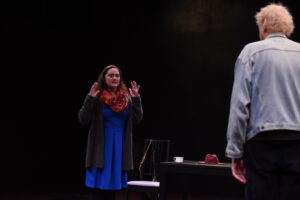
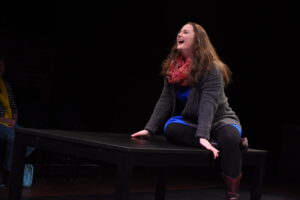
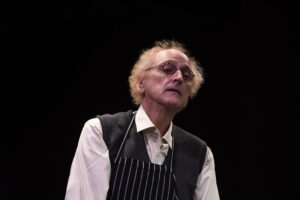
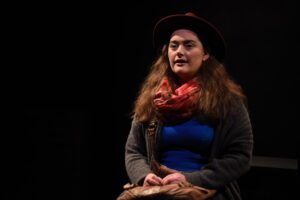
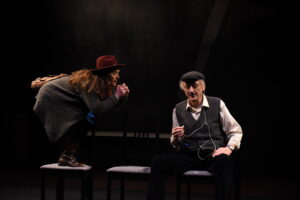
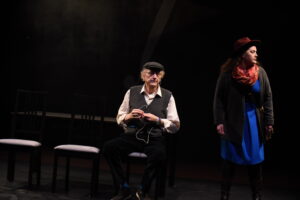
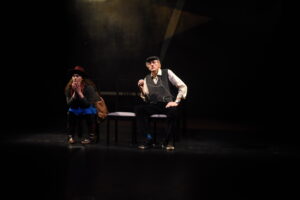
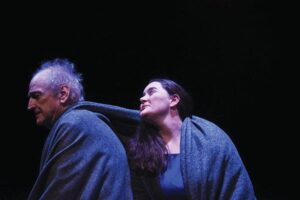
Have a fond or interesting memory of this play you’d like to share with us? We’d love to hear it!
Please Contact Us to Share!
Burning Coal Theatre
(919) 834-4001
224 Polk St., Raleigh NC 27604
Played January 19-February 5, Heisenberg: A Love Story
The Royale
The Royale by Marco Ramirez
Dir. Avis Hatcherpuzzo
Dates: April 6-23, 2017
Artistic Director’s Notes:
In Martin Scorsese's great film The Last Waltz, the angelic-voiced Richard Maneul muses, in
describing The Band’s last concert: “It was the beginning of the beginning of the end of the
beginning.” I used to think he was crazy or high or just being overly “artsy”, but as I stare at the
crossroads of Burning Coal’s past and its future, I begin to see the meaning in his words. The 20
years we will complete in June with The Greeks (Sophocles’ great work, adapted by our own Ian
Finley), is disorienting to me. Could it really have been that long ago? And are all those productions in the past? Or are they preludes to things yet unseen? Or maybe they are a foundation upon which to build? If I look toward them, am I looking backward, stuck in the past (every artist’s nightmare), or am I looking forward by seeking guidance from those successes
and failures. And is it even possible to recognize the one from the other, covered as each
production is with the patina of nostalgia, hazy memory, love or the other thing for those
involved? Perhaps it is both.
The things I draw strength from. The things I most relish from our 20 years in Raleigh are many: the creation of a magical performance space (a must for us when we started out), the realization of many challenging and rewarding productions, the presentation of many new works, from
writers like Kelly Doyle, Ian Finley, Angus mcLaughlin, Randy Rand, Floraine Kay and others.
Heck, we even did a two part, 5 hour music adaptation of a Thomas Hardy novel (and lived to
tell the tale). We have done quiet 2-handers like the recent beautiful Heisenberg and roof-raising spectacles like Enron and All the King’s Men. We have done plays by American writers, English writers, Irish writers, Spanish writers, South African writers, and even Norwegian writers. We’ve
worked with an actor from the Berliner Ensemble and an actor who’d never been onstage before. We’ve done political plays (many!), personal plays, history plays, comedies, dramas, musicals and even aerial plays.
Nothing Burning Coal will do this year, next year, or any year, is more important than the development of new work. South Eastern Center for Contemporary Arts is one of several new plays we’ve presented over the years. Angus is a very talented writer of both screenplays (Junebug, the upcoming Stone) and plays (The Dead Eye Boy, The Radiant Abyss). His lifelong effort to build a life as an artist in his hometown of Winston-Salem is a magnificent example of what is possible and also a clarion call for communities like his own to step up and support professional artists in their midst. At Burning Coal, we have made a firm commitment to the production of new plays and we mean to stick to it. Next year, we will present the world premiere of Raleigh-based playwright Kelly Doyle’s Blue. It is a remarkable, fun, savagely pointed work by a young woman who has as much talent as any writer working in the theatre today. That our audience in Raleigh will be the first to see it is both a tribute to Raleigh’s growth as an incubator for the arts and a hint at what the future may hold.
What excites me about the next twenty years is that we have some direction now. We’re not so much like the man in the wilderness, hacking away blindly with his machine. We have a road
map. That map is the past. It leads to the future. As the city’s population swells around us, I can palpably feel the need from them–our audience, our neighbors. They are looking for direction, too. If we are very fortunate and work very hard, we will have some say in that direction. That’s why we began this theatre and that is what we know will ultimately be its legacy. Are you ready to go?
Jerome Davis
Crew:
Stage Manager: Alex Procknow
Technical Director: Barry Jaked
Props: Elizabeth Newton
Lighting Design: Christopher Popowich
Scenery Design: Trevor Carrier
Costume Design: Cassidy Nolde
Sound and Graphics Design: Areon Mobasher
Study Guide: Eric Kildow
Asst. Stage Managers: Chris Acevedo, Naomi Barbee, Yvette Beale, Jeffrey Kare
Asst. Technical Director: Ainex Carmona, Jonesy Jones
Master Electrician: Mia Carson
Scenic Artists: Meredith Riggan, Gabrielle Stephenson
House Manager: Carry Vaughan
Fight Coaches: Remy Fullwood and Wes Caudill
Dialect Coach: Rebecca Bossen
Movement Asst. Sheldon Mba
Cast:
Preston Campbell – Jay “The Sport” Jackson
Alex DeVirgilis – Max
Danielle J. Long – Nina
Sheldon Mba – Fish
Phillip Bernard Smith – Wynton
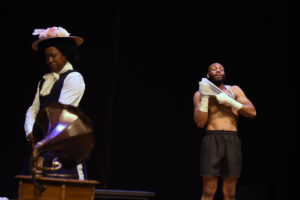
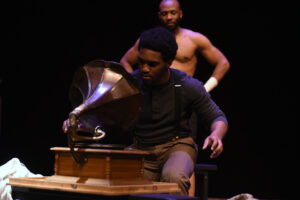

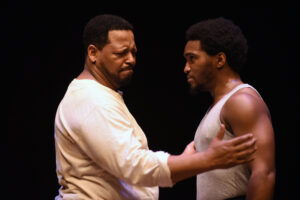

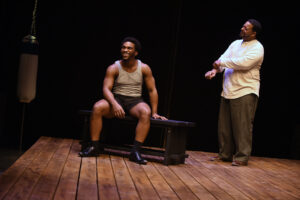
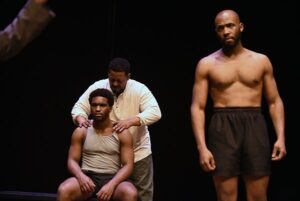
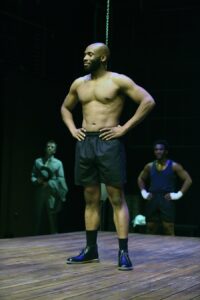
Have a fond or interesting memory of this play you’d like to share with us? We’d love to hear it!
Please Contact Us to Share!
Burning Coal Theatre
(919) 834-4001
224 Polk St., Raleigh NC 27604
Played April 15-May 2, 2010: Gee's Bend & SECCA
Season 21: (2017-2018)
Darkside
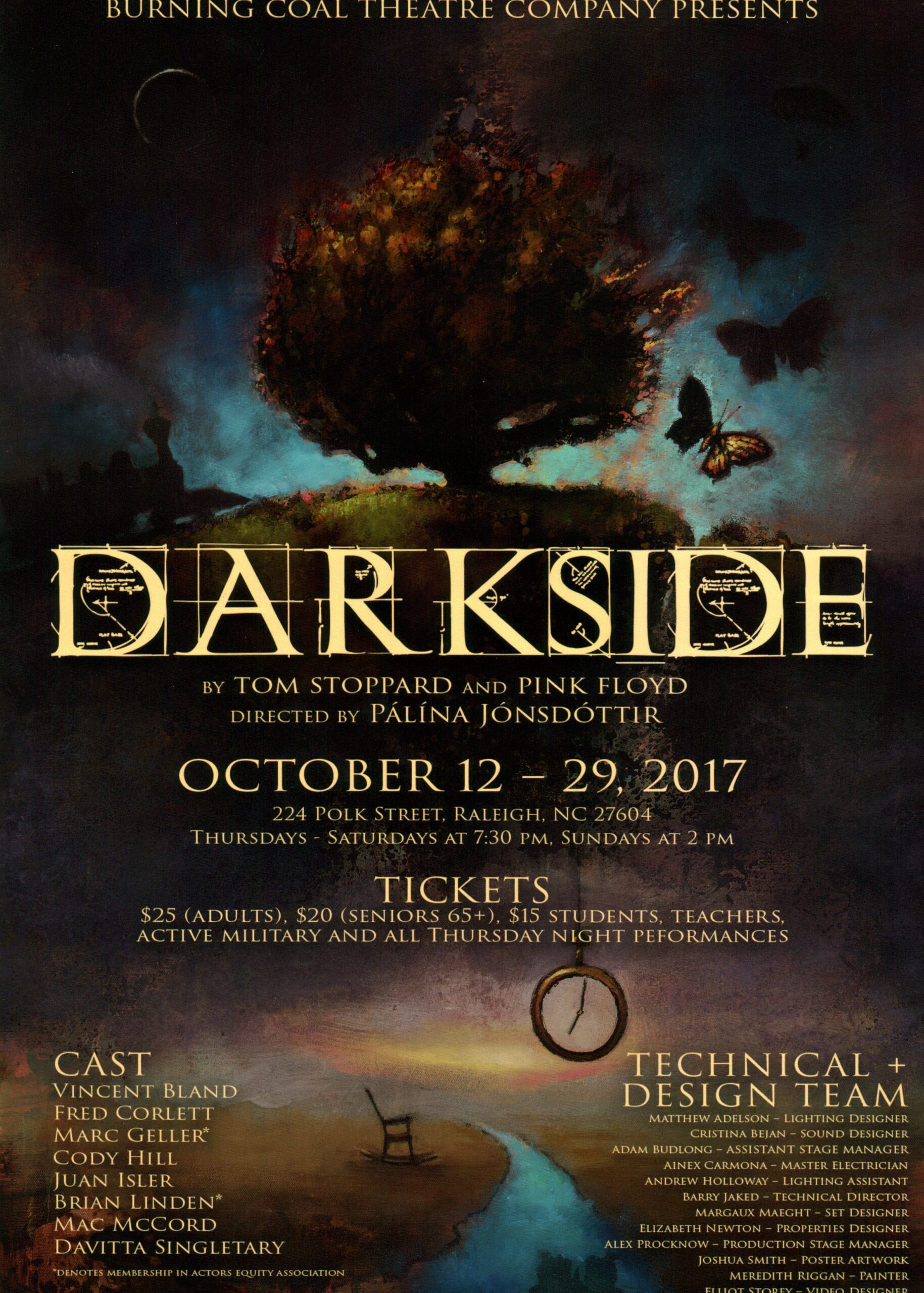
Darkside by Tom Stoppard and Pink Floyd
Dir. Pálína Jónsdóttir
Dates: October 12-29, 2017
Location: Murphey School
Peter Pan & Wendy
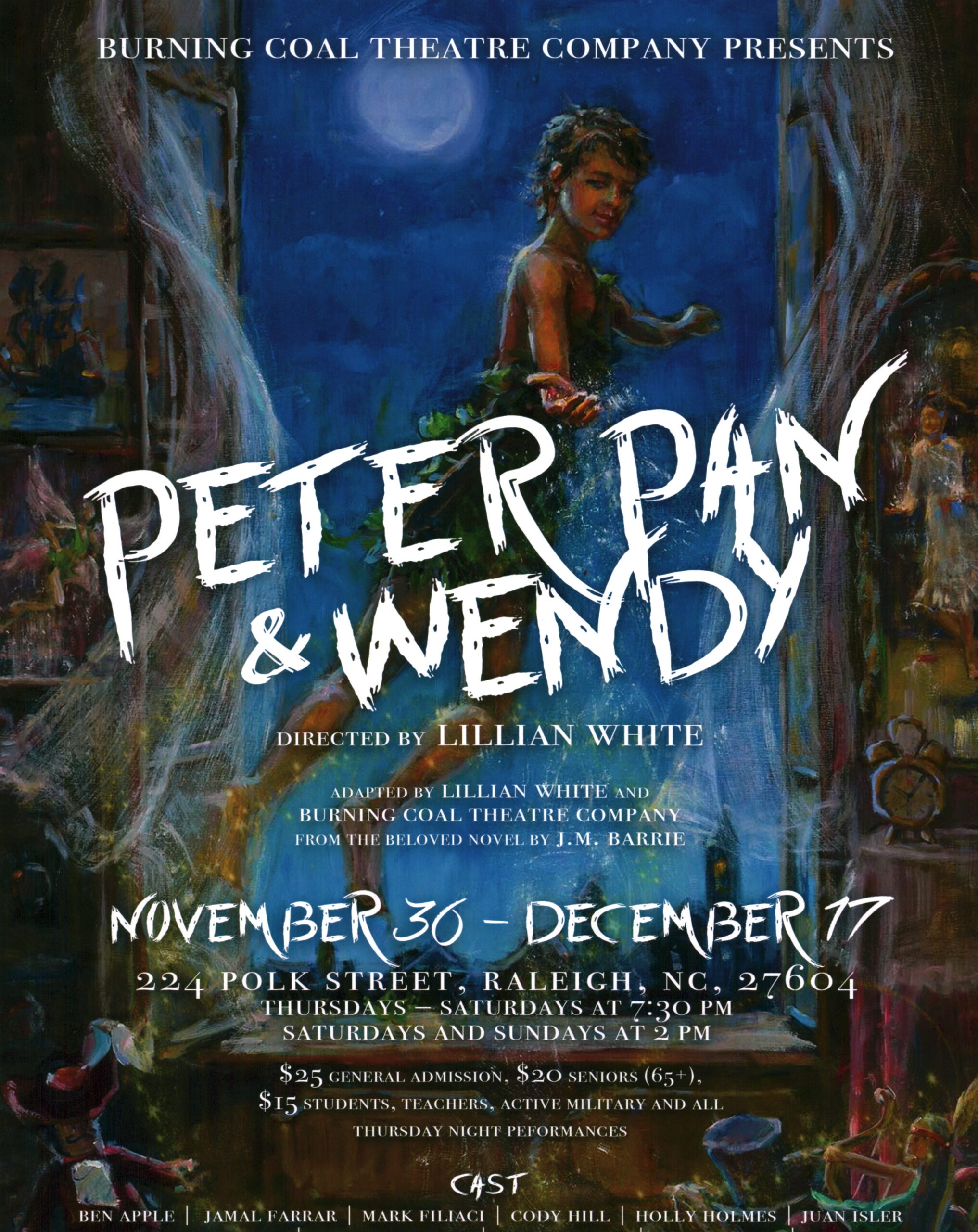
Peter Pan & Wendy adapted by Lillian White
Dir. Lillian White
Dates: November 30-December 17, 2017
Location: Murphey School
The Normal Heart
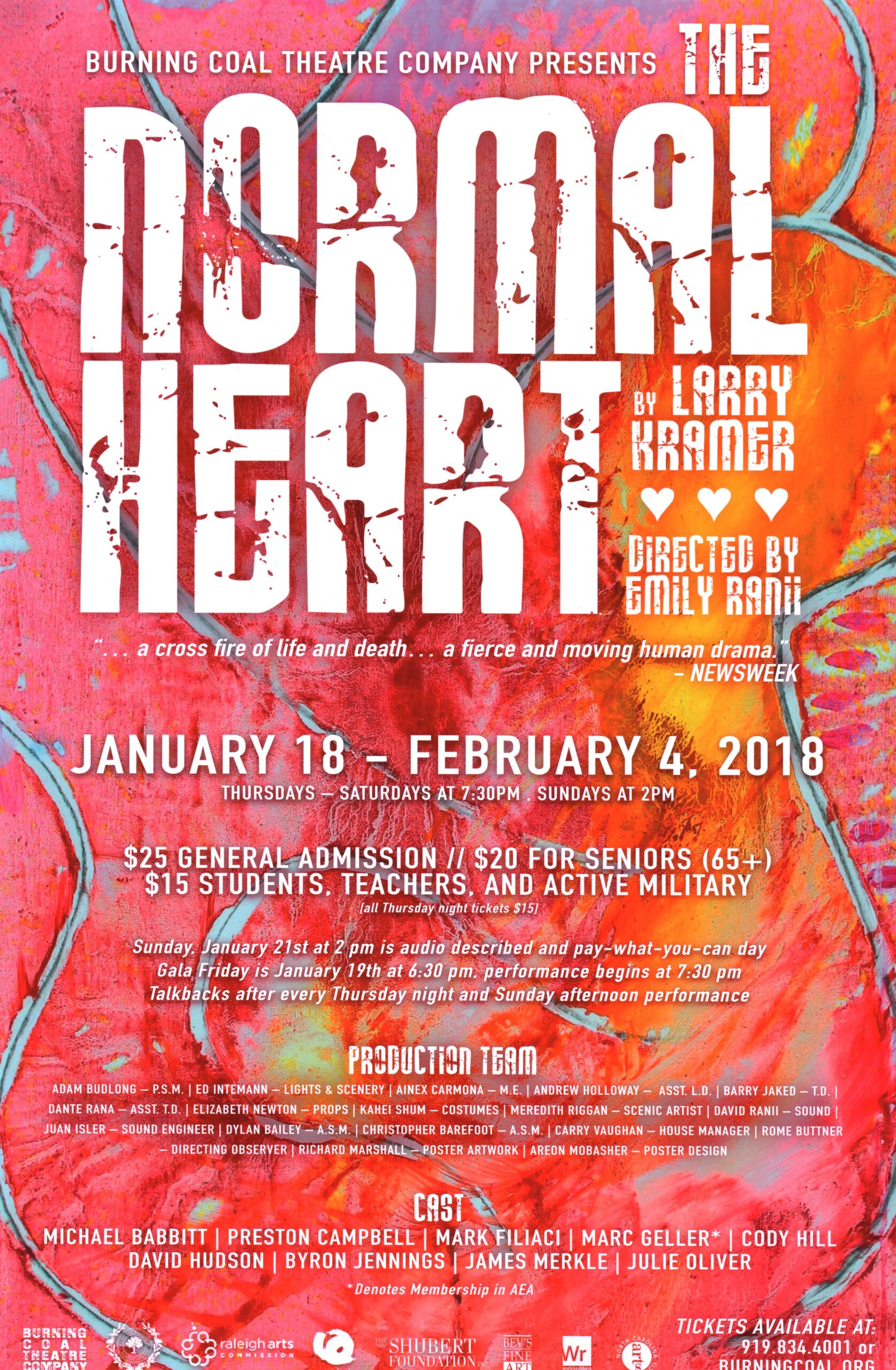
The Normal Heart by Larry Kramer
Dir. Emily Ranii
Dates: January 18-February 4, 2018
Location: Murphey School
King Charles III
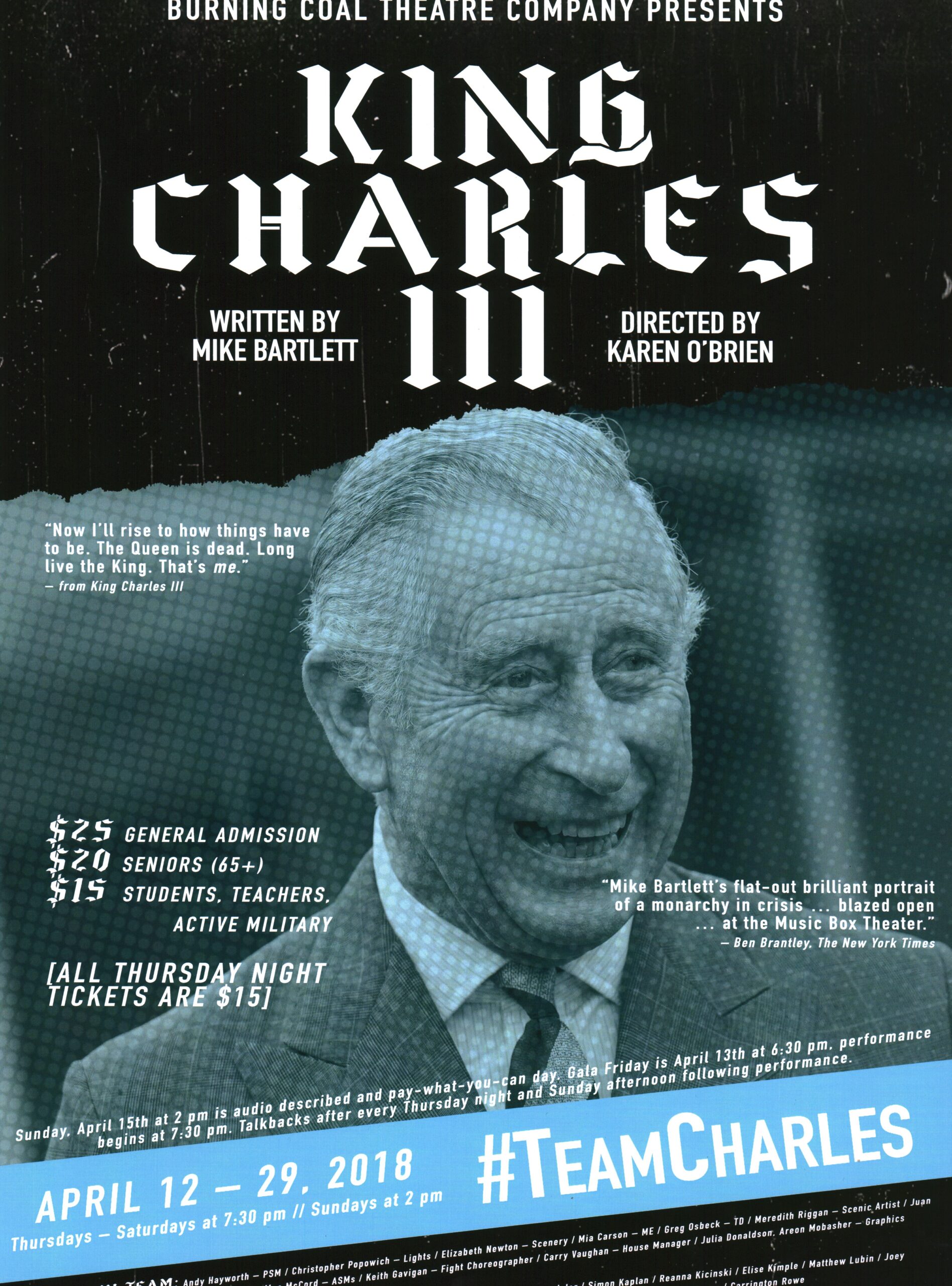
King Charles III by Mike Bartlett
Dir. Karen O'Brien
Dates: April 12-29, 2018
Location: Murphey School
Darkside
Darkside by Tom Stoppard and Pink Floyd
Dir. Pálína Jónsdóttir
Dates: October 12-29, 2017
Location: Murphey School
Artistic Director’s Notes:
I’m turning this page over to my ‘little’ brother, Tim X. Davis, who forgot more about Rock and Roll than I’ll ever know. And I know a lot!
March 1st, 1973 a group of English lads released a record that forever change the landscape of
modern music, remain in the Billboard charts for a whopping 741 weeks, sell over 45 million copies, and create a legion of fans over the next five decades. While “the Floyd” had certainly
amassed a legion of fans with their previous works (most under the stewardship of Syd Barrett), nothing really prepared the world for what was to come. Recorded at Abbey Road Studios (No, that wasn’t the cute Beatle with the “I don’t know, I was really drunk at the time” line on US AND THEM, but it WAS one of his Wings bandmates) and engineered by future classic rock radio staple Alan Parsons, the album is a sonic marvel. From the soaring vocals in “The Great Gig in the Sky” to the haunting romantic “Us and Them,” the loose, almost funky commercial
juggernaut “Money”, to the raging alarms that herald the opening of my own favorite track
“time”, the music of DARK SIDE is engrained in our culture as sure as any music of the last 100
years.
It was probably the late 70s before Floyd came onto my own personal radar. Their epic “The
Wall” album was everywhere as I entered the hellish void of middle school and those tunes made me want to explore Floyd’s earlier material. My older brothers were instrumental in introducing me to new sounds in those days, and sure enough, they were already onto Dark Side. I’ll never forget cruising along with my brother on an early morning paper route listening to “Brain
Damage/Eclipse” hours before the sun rose. Roger Walter’s voice murmuring about “the lunatic in my head” combined with David Glimour’s sparse, haunting guitar lines and the swirl of Rick Wright’s Hammond B3 organ created a sonic landscape the likes of which that 12 year old had never imagined, and helped to open my mind and my ears to newer, more sophisticated sounds.
It also vaguely creeped me out, but in a good way. In a way that only Pink Floyd has ever
managed to do, be it with Dark Side, the sprawling brilliance of “Wish You Were Here,” or the sad, forlorn sounds of “The Final Cut.” No other band reaches into your mind and takes you on a
fantastic voyage like those 4 could.Alas, they are no more. Roger Waters, God Bless him, is still raging against the machine with his
epic live shows and middle finger to the injustice in the US and abroad. David Gilmour (with Nick Mason in tow) carried on the Floyd in name only for a number of years, and he still can lay down a mean lick. And the great Richard Wright who’s jazz inspired passages were the bedrock
of Floyd’s instrumental sound, passed on in 2008. And although the surviving members will
likely never reunite (the Live 9 show in 05 was as close as we’ll get to that), as cliché as it sounds, we’ll always have the music.
Far away across the field
The lolling of the iron bell
Calls the faithful to their knees
To hear the softly spoken music spells…
Tim X. Davis Lexington, KY
Crew:
Stage Manager: Alex Procknow
Technical Director: Barry Jaked
Props: Elizabeth Newton
Lighting Design: Matthew Adelson
Scenery Design: Margaux Maeght
Costume Design: Palina Jonsdottir
Costumes Asst.: Cassidy Nolde
Sound Design: Cristina Bejan
Video Design: Elliot Storey
Study Guide: Eric Kildow
Asst. Stage Managers: Adam Budlong, Madison Doss, Skylar Noble
Master Electrician: Ainex Carmona
Scenic Artist: Meredith Riggan
Poster Layout: Areon Mobasher
Asst. Director: Lillian White
House Manager: Carry Vaughan
Asst. Technical Director: Dante Rana
Lighting Asst. Andrew Holloway
Voiceover Artists: Rhonda Brocki, Lou Campbell, Jerry Davis, Thom Haynes, Gwen Hendrix,
Maneesha Lassiter,Zoe Nagel, Carla Reck
Cast:
Vincent Bland, Jr. – The Wise One
Fred Corlett – Banker
Marc Geller – Dr. Antrobus/Witch Finder
Cody Hill – The Boy
Juan Isler – Fat Man
Brian Linden – Mr. Baggot/Ethics Man
Mac McCord -Politician
Davitta Singletary – Emily
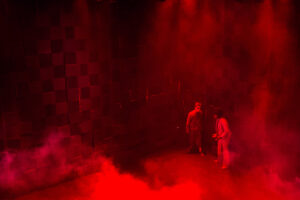
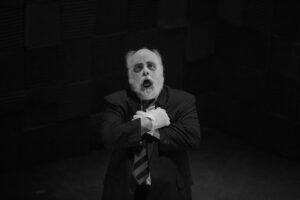
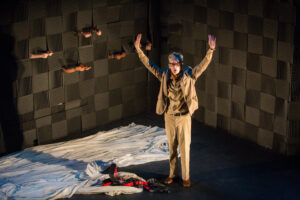
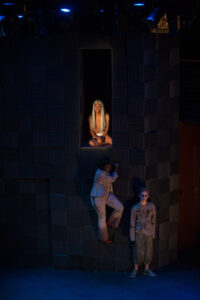
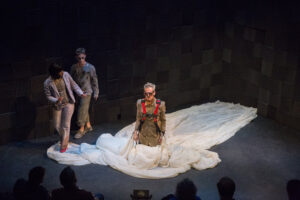
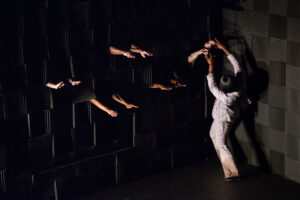
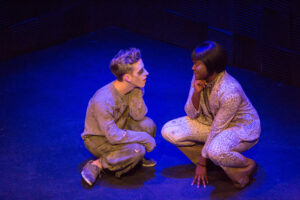
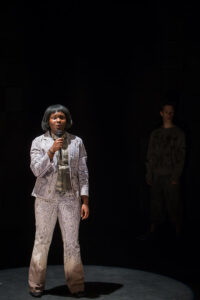
Have a fond or interesting memory of this play you’d like to share with us? We’d love to hear it!
Please Contact Us to Share!
Burning Coal Theatre
(919) 834-4001
224 Polk St., Raleigh NC 27604
Played October 12-29 2017, Darkside
Peter Pan & Wendy
Peter Pan & Wendy adapted by Lillian White
Dir. Lillian White
Dates: November 20-December 17, 2017
Location: Murphey School
Artistic Director’s Notes:
Here we are in our 21st season doing some new things. We’re devising a show, which we’ve
never done, we’re doing a children’s story, which we’ve never done, and we are also doing a
season of all female directors, which we have never done. One of the great pleasures and
privileges of working for this audience, in this town, is the degree to which you, our neighbors, are willing to go on new journeys with us. When Simmie and I moved to this area in 1996, we knew only that we wanted to be somewhere in that great expanse of exoticism, “the South,” and
that we wanted to find a town that had both a baseline of support for the arts and the need for the kind of work we wanted to do. With hindsight, that sounds a little grand! I do believe, however, that we live in a world, now, where fewer and fewer people are controlling more and more of the resources of that world. The saying “history is written by the winners” was never so relevant as it is today. The public discourse, the “narrative,” if you will, is mostly, and en masse, being controlled by a few people who, however decent and right-thinking they may be, inevitably have
a limited world view. When the printing press came into existence, it opened up avenues of
expression for the common folks, and of course gave them the chance to do something almost no one outside the royalty had done up to that point: read and write, because it became cheap to publish books. In the 20th century, the internet had a similar effect, giving voice, for better and
for worse, to people who in past generations would have been confined to the hack benches, so to speak (because it became cheap to broadcast). With the impending removal of ‘net neutrality’ from the internet, we are about to see a step backward in the march toward equality. How can all
people be equal if only a very few have control of the narrative. To some degree, it has always
been the case, but only recently have we seen draconian measures (like the loss of habeas
corpus) that have turned that march into a retreat.
What does all that have to do with Peter Pan? Well, I think the trajectory of the story is one that we can all take heart in, and perhaps look to as a model. A man, despondent at the loss of a loved one, tells a story to a child. The story is celebrated, becomes a stage play and eventually a (much
different and beloved) novel. From that story, films, teleplays, songs, poems and even
personalities bloom. This is an extraordinary achievement, and it began not in a laboratory, not
in a conference room or even in a grand building where art sold. It began in one person’s mind.
JM Barrie. And the world shifted and shuttered as the imaginations of children took flight. Let us
not undersell the power of the simple act of telling a story, and in doing so, claiming our right to contribute to a narrative that a very few seem currently vent on monopolizing.
Jerome Davis
Crew:
Choreographer: Robin Harris
Stage Manager: Chris Acevedo
Technical Director: Barry Jaked
Scenery & Props Design: Elizabeth Newton
Lighting Design: Mextly Almeda
Costume Design: Katie Werlin
Sound Design: Christy Rose
Study Guide: Eric Kildow
Stage Managers: Cory Arnold, George Russing. Carry Vaughan
Dramaturg: Marshall Botvinick
Master Electrician: Ainex Carmona
Scenic Artist: Meredith Riggan
Poster Art: Nicole White Kennedy
Poster Layout: Areon Mobasher
Directing Observer: Jasmine Rochelle
House Manager: Carry Vaughan
Musical Consultant: Julie Oliver
Asst. Technical Director: Dante Rana
Asst. Lighting Designer: Andrew Holloway
Asst. Choreographer: Holley Holmes
Fight Choreography Consultant: Alec Silver
Asst. Scenic Designer: Madison Mattfield
Cast:
Ben Apple -Nana/Starkey
Jamal Farrar – Nibs
Mark Filiaci – Mr. Darling/Crocodile
Cody Hill – Tootles
Holly Holmes – Tinkerbelle/Jane/Mermaid
Juan Isler – Smee
Shawn Morgenlander – Wendy
Kaley Morrison – Tsi-La/Neverbird
Ford Nelson – John
Julie Oliver – Mrs. Darling/Captain Hook
Alec Silver – Peter Pan
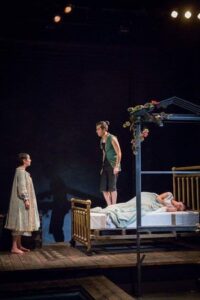

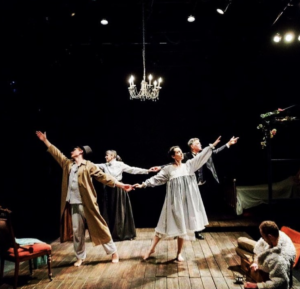
Have a fond or interesting memory of this play you’d like to share with us? We’d love to hear it!
Please Contact Us to Share!
Burning Coal Theatre
(919) 834-4001
224 Polk St., Raleigh NC 27604
Played November 20-December 17 2017, Peter Pan & Wendy
The Normal Heart
The Normal Heart by Larry Kramer
Dir. Emily Ranii
Dates: January 18-February 4, 2018
Location: Murphey School
Crew
Stage Manager: Adam Budlong
Technical Director: Barry Jaked
Props: Elizabeth Newton
Lighting and Scenery Design: ED Intemann
Costume Design: Kahei Shum
Sound Design: David Ranii
Sound Engineer: Juan Isler
Graphics Design: Areon Mobasher
Study Guide: Eric Kildow
Asst. Stage Manager: Dylan Bailey, Christopher Barefoot. Riley Lang. Damion Younts
Master Electrician: Mia Carson
Scenic Artists: Meredith Riggan
Asst. Technical Director: Dante Rana
Asst. Director: Donovan O’Daniel
House Manager: Carry Vaughan
Directing Observer: Rome Buttner
Model & Drawings: Charles Holden, Architect-Builder, Oxide Architecture
Cast
Michael Babbitt – Mickey Marcus
Preston Campbell – Felix Turner
Marc Filiaci – Ben Weeks
Marc Geller – Ned Weeks
Cody Hill – Tommy Boatwright
David Hudson – David/Hiram Keebler/Examining Doctor/Orderly
Byron Jennings – Bruce Niles
James Merkle – Craig Donner/Grady/Orderly
Julie Oliver – Dr. Emma Brookner
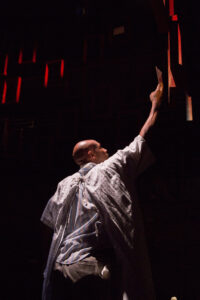
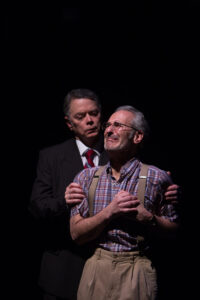
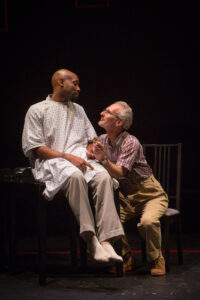
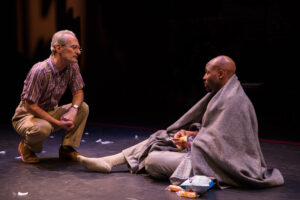
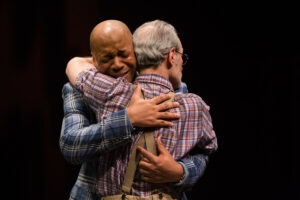
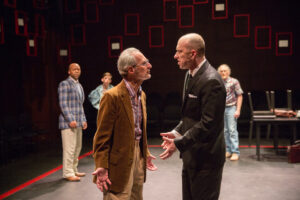
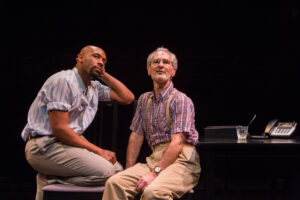
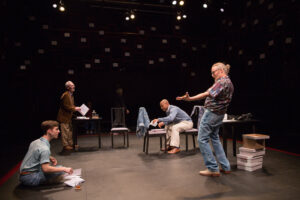
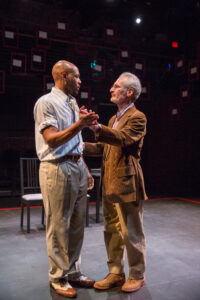
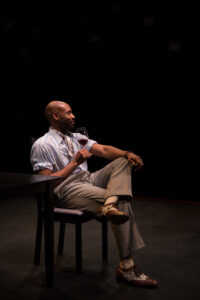
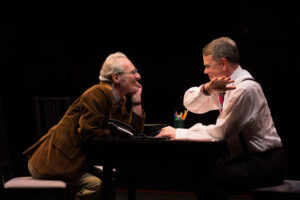
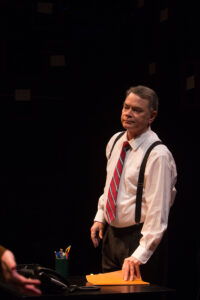

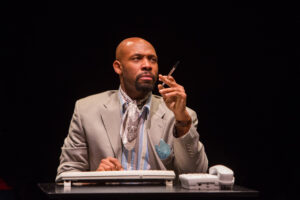
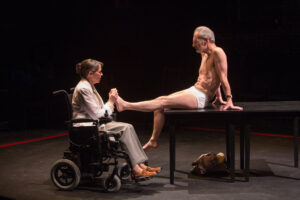
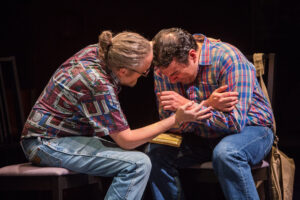
Have a fond or interesting memory of this play you’d like to share with us? We’d love to hear it!
Please Contact Us to Share!
Burning Coal Theatre
(919) 834-4001
224 Polk St., Raleigh NC 27604
Played January 18-February 4, 2018: The Normal Heart
King Charles III
King Charles III by Mike Bartlett
Dir. Karen O’Brien
Dates: April 12-29, 2018
Location: Murphey School
Artistic Director’s Notes:
Welcome to the closing production of our 21st season. The season was originally scheduled to
include a performance of Amadeus, by Peter Shaffer…but after granting us rights to to the play, the royalties company came back and pulled them, insisting that a national tour of Amadeus would be coming through our area in May. We’ll see if that actually happens, but I do have to
admit that when I got their email, I was slightly heartened because…well, because ever since I
saw King Charles III in London in 2014 I have been able to think of little else. So, when we lost Amadeus I wrote (again) to its royalties company and this time, to my delight, they told me it was available. After that came the disheartening idea that I was going to have to dismiss a cast that I’d had set to do Amadeus for six months and replace them. But as I walked through the list
of roles in King Charles III, it became pretty immediately clear that we could transfer every
single actor from one show to the next, and offer them extraordinary (and in most cases, better) roles than they’d agreed to do in Amadeus. My delight was even greater when, one by one, each
actor, having read King Charles III accepted the new role! I tell you that story because it gives
you a little bit of insight into the working life of a theatre manager and perhaps helps to explain
why one beloved play has been replaced on our season by a new, almost entirely unknown paly.
The second story that I think is relevant to this dates back to that overcast April night in London 2014 when I led a group of intrepid American tourists into the tiny Almeida Theatre in Islington. I had frankly been a bit trepidations about King Charles III. Sure, the young playwright was
making a name for himself, sure the Almeida had a knack for hitting the nail on the head, and sure the director, Rubert Goold, had previously directed one of my favorites, Enron…but a three
hour long verse drama? Really? (NOTE: Our production will not be 3 hours long, relax!).
Anyway, I had little choice, and so I selected the play and dragged our group of travelers into the misty North London night. After the show was over, one of the travelers raced out of the
building and leapt into my arms, declaring his eternal gratitude for my having “introduced him to this play.” I said” I knew it was going to be good!”
So now you understand the tenuous nature of this business. If you like this play, know that you
have a piece of drywall roofing to thank. And if you do love it as much as I do, I will ask, simply, that you all not leap at once!
Jerome Davis
Crew
Music Director: Julie Oliver
Stage Manager: Andy Hayworth
Technical Director: Greg Osbeck
Props: Danielle James
Lighting Design: Christopher Popwich
Scenery Design: Elizabeth Newton
Costume Design: Bonnie Raddatz
Sound Design: Juan Isler
Graphic Design: Areon Mobasher and Julia Donaldson
Study Guide: Eric Kildow
Asst. Stage Manager: Luke Basile, Duncan MacGregror. Mac McCord
Master Electrician: Mia Carson
Scenic Artist: Meredith Riggan
House Manager: Carry Vaughan
Asst. Director: George Scholosser
Fight Director: Keith Gavigan
Dialect Coach: Simon Kaplan
Costume Asst.: Barbara Crabb
Social Media: Cristina Bejan and Madison Doss
Cast:
Ben Apple – Harry, of Wales
Jeff Cheek – Mr. Stevens, Leader of the Opposition Party
Kimmy Fiorentino – Ensemble, U/S (Jess)
Joey Infinitio – Mr. Evans, Prime Minister
Mya Ison – Jess
Simon Kaplan – James Reiss
Reanna Kicinski – House Speaker, TV Producer, Sir Michael
Elise Kimple – Sarah, Ghost, Newspaper Woman
Matthew Lubin – Spencer, Nick, Butler, Servant
Lilly Nelson – Camilla, Duchess of Cornwall
Brandonn Odom -Cootsy, Paul, Terry, Sir Gordon, Archbishop
Chloe Oliver – Catherine (Kate), Duchess of Cambridge
Randolph Curtis Rand – King Charles II
Lucius Robinson – William, Duke of Cambridge
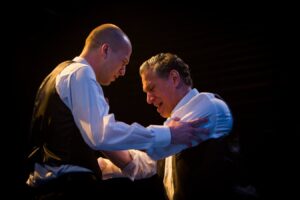
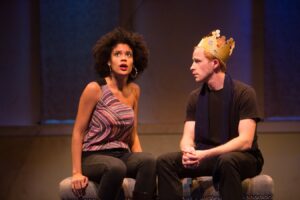

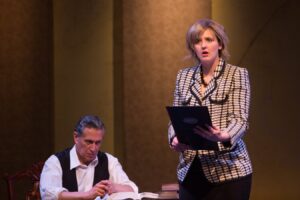
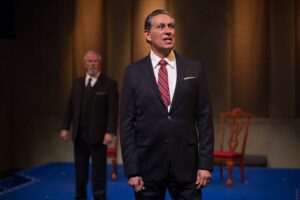

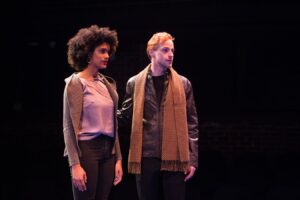
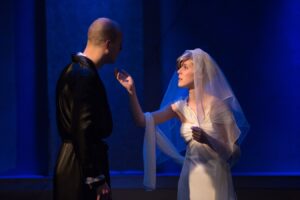
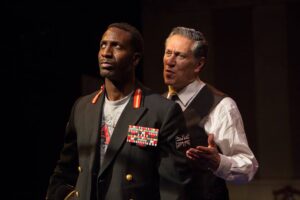
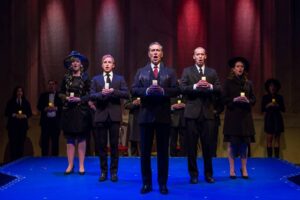

Have a fond or interesting memory of this play you’d like to share with us? We’d love to hear it!
Please Contact Us to Share!
Burning Coal Theatre
(919) 834-4001
224 Polk St., Raleigh NC 27604
Played April 12-29, 2018: King Charles III
Season 22: (2018-2019)
Stuff Happens
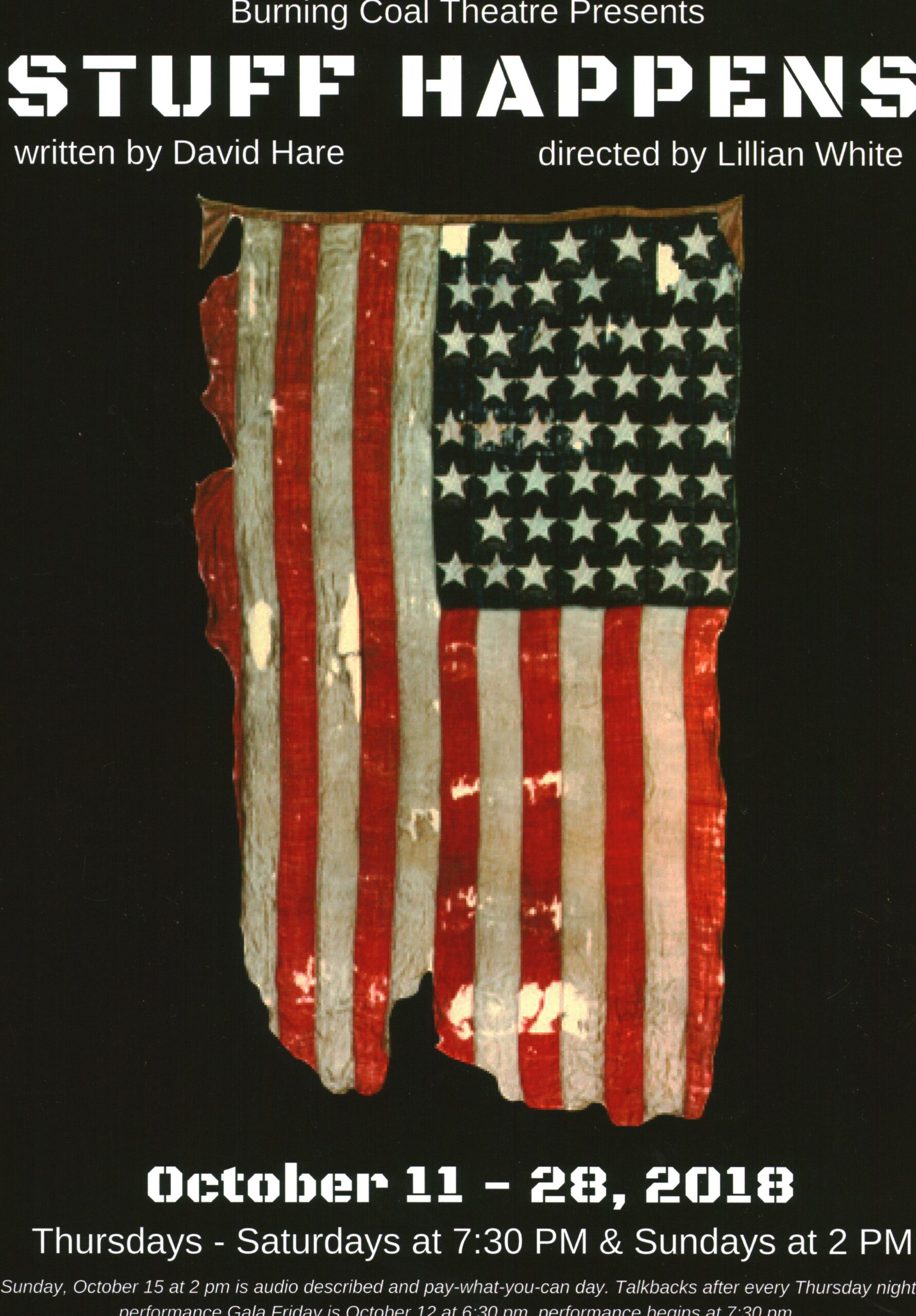
Stuff Happens by David Hare
Dir. Lillian White
Dates: October 11-28 2018
Location; Murphey School
The Weir
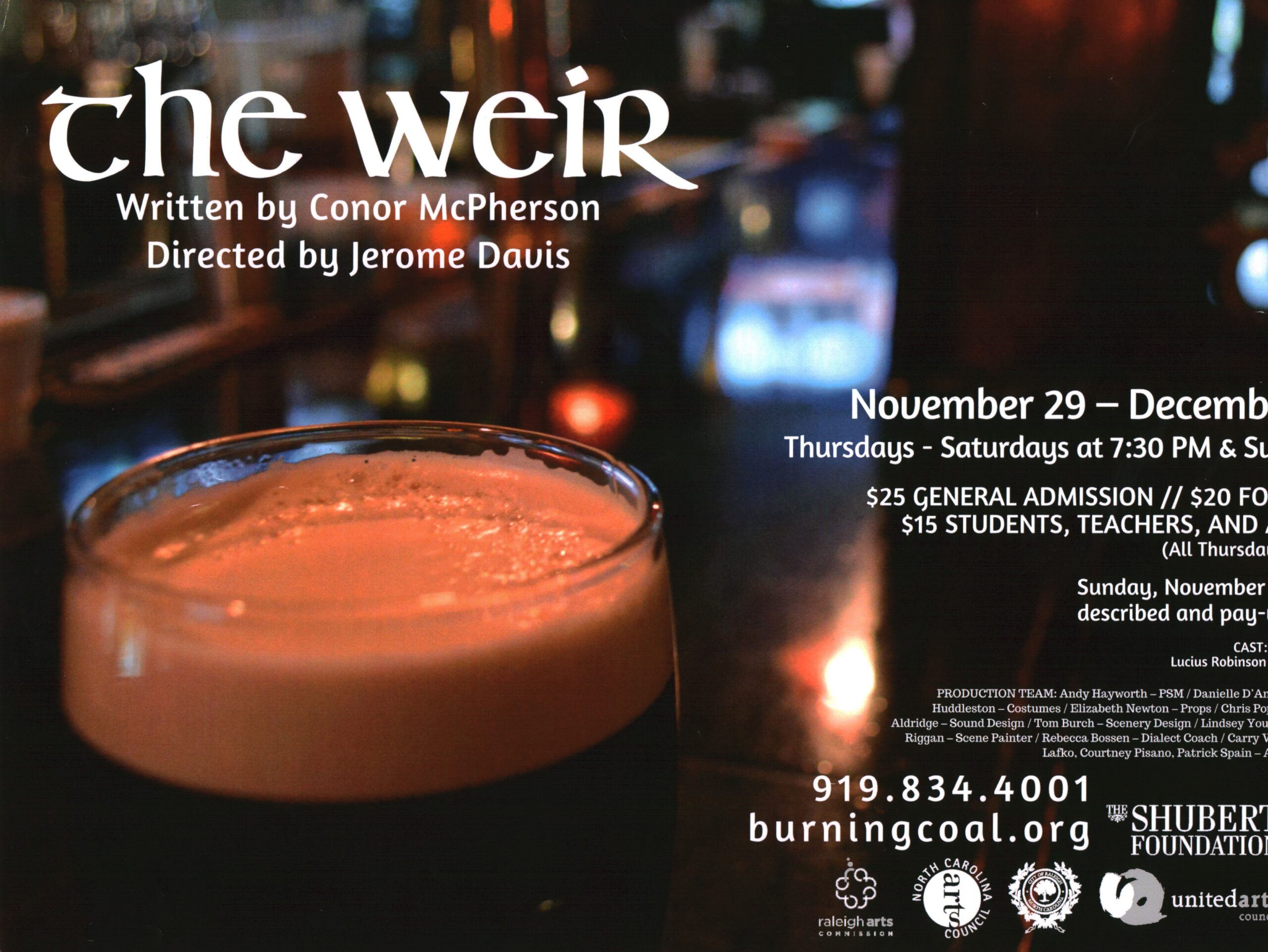
The Weir by Conor McPherson
Dir. Jerome Davis
Dates: November 29-December 16
Location: Murphey School
Ashe in Johannesburg
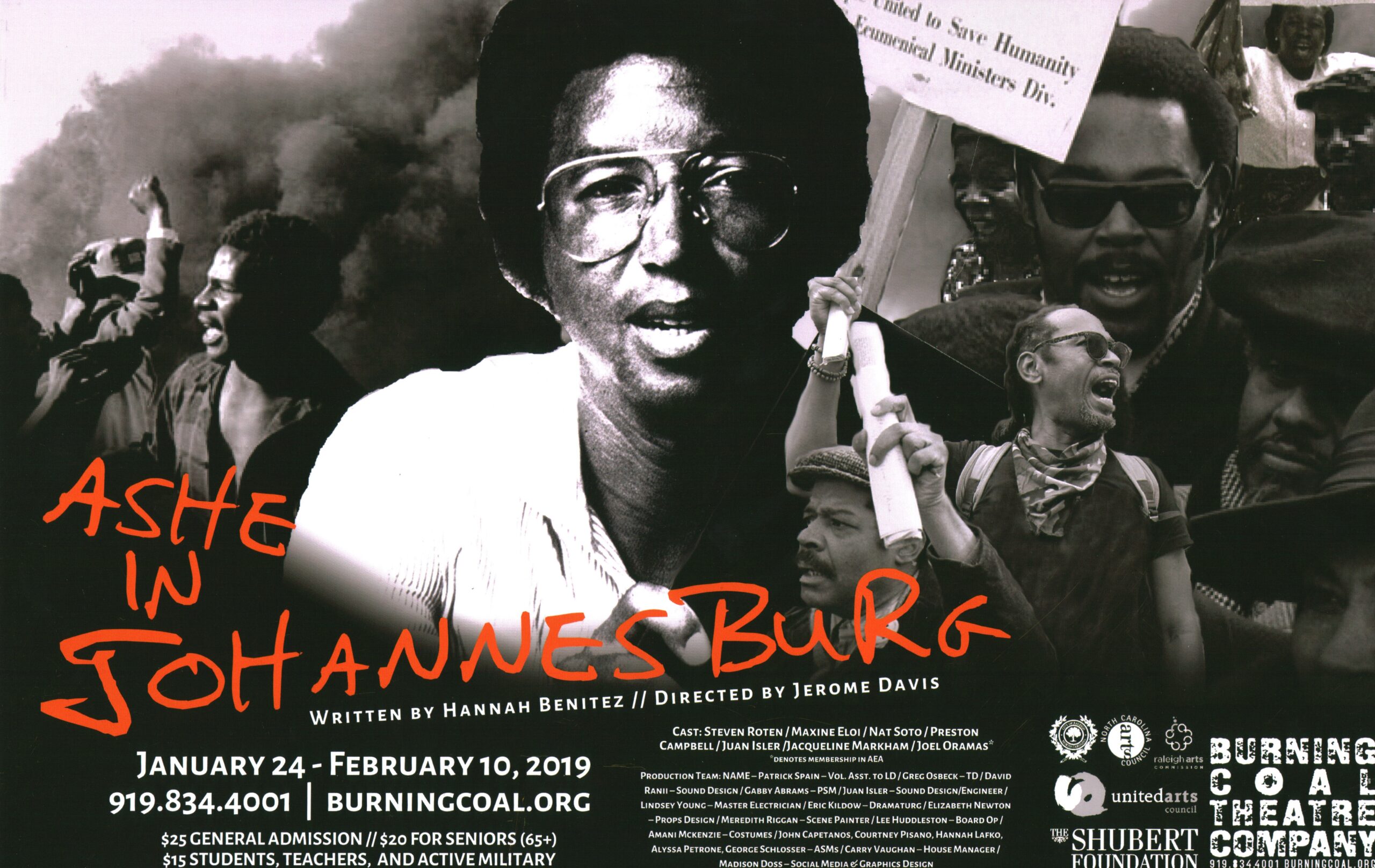
Ashe in Johannesburg by Hannah Benitz
Dir. Jerome Davis
Dates: January 24-February 10, 2019
Location: Murphey School
Jude the Obscure
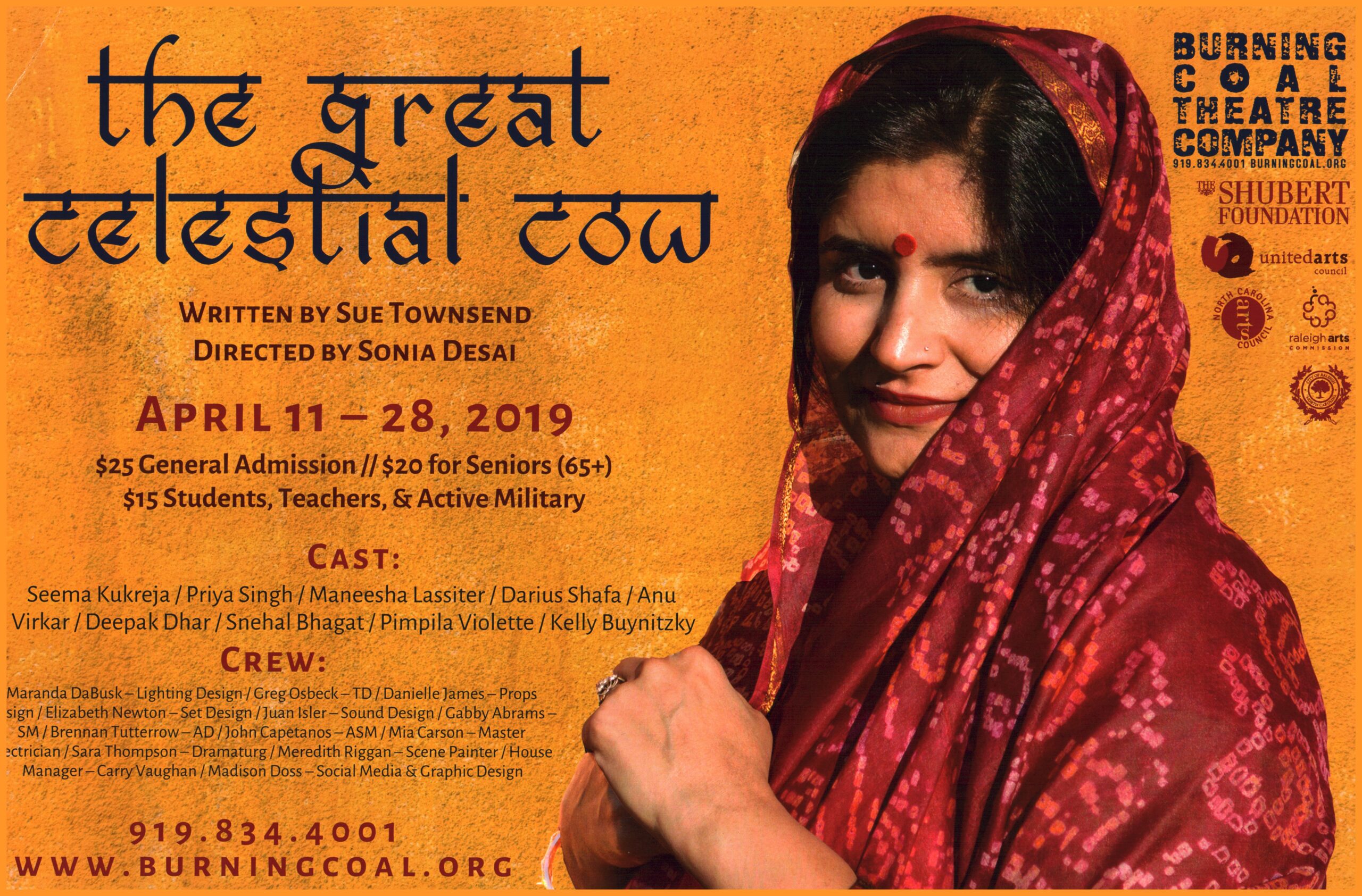
The Great Celestial Cow by Sue Townsend
Dir. Sonia Desai
Dates: April 11-28, 2019
Location: Murphey School
Stuff Happens
Stuff Happens by David Hare
Dir. Lillian White
Dates: October 11-28, 2018
Location: Murphey School
Artistic Director’s Notes:
David Hare is among my favorite playwrights. He originally wanted to be a director, but when
his fledgling touring company, Portable (i.e., some actor/friends in a van performing at…well
anywhere that would have them) found themselves less than a week away from opening a play
with no actual script in sight, Hare stepped in and wrote something for the company. He has been
writing plays, screenplays, essays and books ever since and his collection of work is among the greatest written during the second half of the 20th century. Burning Coal has produced two
previously, Skylight and A Map of the World. David Hare became David Hare because he saw a void and filled it. He didn’t say “Well, I might fail” or “What I really want to do is act, so I’ll just wait for someone else to step up.” He didn’t even say “the pay is no good.”
This year marks the 15th anniversary of the invasion of Iraq. Our constitution grants congress the
right to declare war. However, it gives us the right to elect representatives, and that is where the power of the people rests. But the people can be misled, persuaded to go along. The only real
hedge against this happening is the existence of a robust press, who’s responsibility it is to
inform the public. With the Iraq war, as with many previous wars (the Spanish American war, the coups waged by our country against the sovereign islands of Hawaii and the democratically elected leader in Iran in the 1950s, not to mention the Vietnam War, where evidence suggests that neither of the two Gulf of Tonkin incidents actually happened in the way our government
said they did), our ‘watchdogs of society’ turned out to be, collectively, a mouthpiece for the powerful, an amplification system for the drumbeat to war. That three powerful subsets of
society, business interests, politicians and the press, live in the same few cities, attend the same universities, work for the same companies (when out of office) does not surprise.
In these times, it seems we are waiting for others to step up. We comfort ourselves with the thought that its not our responsibility. But surely in a democratic republic such as ours, it is all of our responsibility. The economist Yanis Varoufakis recently pointed out that in the land where the very concept of democracy originated (his native Greece), people who spoke too eloquently were viewed suspiciously. Why? Because the ancient Greeks believed that words were powerful
and could be manipulated to lead the masses astray. This is an interesting idea, particularly for someone like myself, who has spent most of my life working in art from where the more
articulate the text, the ‘better’ the play is considered to be. Hare is among the most articulate and persuasive of writers, but he does an interesting thing with his talent” he often gives the best lines to those with whom he disagrees. In other words, he pushes against his own thinking, he challenges himself. That is an honorable thing for an artist to do. Unfortunately, the power hungry, the greedy and the egomaniacal don’t play by those rules. They use language, what is
said, when it is said, how forcefully it is said, and of course, what is not said to persuade. In the
months immediately following the horrific events on 9/11/01, a great deal of persuasive language
and imagery was marshalled to convince the American public, and then the world, that we
should ignore what was patently obvious. Some very intelligent people drafted that language and
spun it out before the world to hear. How is it that those same people, now that their folly has been revealed, are still allowed to speak, to lead?
The answer I’m afraid is that we are sitting back waiting for that script to arrive, and none of us
are getting up and writing it.
Jerome Davis
Crew:
Stage Manager: Andy Hayworth
Technical Director” Greg Osbeck
Props: Danielle Jamese
Lighting & Scenery: ED Intemann
Costume Design: Kahei Shum McRae
Music, Sound, Video Design: Dogbotic
Graphics Design and Social Media: Madison Murphey
Study Guide: Eric Kildow
Asst Stage Manager: Danielle D’Angelo, Alyssa Petrone, George Russing
Asst, Master Electrician: Chris Eck, Tim Parrish, Glenn Sappie
House Manager: Carry Vaughan
Dialect Coach: Rebecca Bossen
Scenic Artist: Meredith Riggan
Asst. Scenic Artist: Cole Train
Cast:
Michael Babbitt – George W. Bush
Matthew Baldiga – Tony Blair
Benaiah Barnes – Angry Journalist, Palestinian Academic
Justin Z. Cole – David Manning
Fred Corlett – Robin Cook
Thomas Goldsmith – Paul Wolfowitz
Rob Jenkins – Dick Cheney
Byron Jennings – Colin Powell
Shawn Morgenlander – Alastair Campbell, Jeremy Greenstock
Brook North – Donald Rumsfeld
Jim O’Brien – Michael Gerson, Hans Blix
Julie Oliver – George Tenet
Darius Shafa – Dominique de Villepin, Iraqi Exile
Michelle Wells – Laura Bush, Jack Straw
Tyanna West – Condoleeza Rice
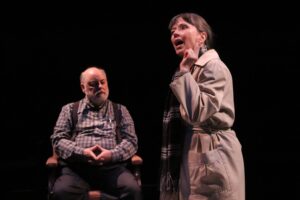
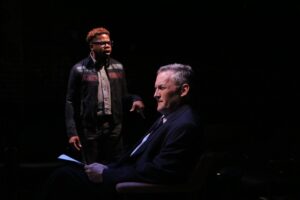
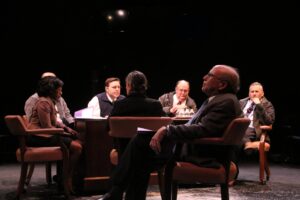
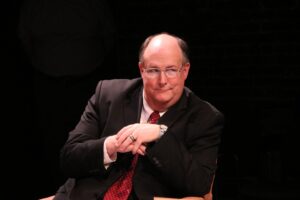
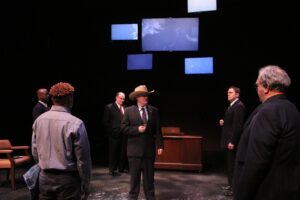
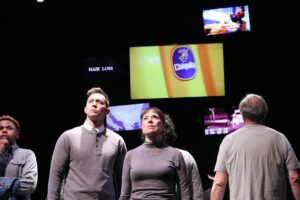
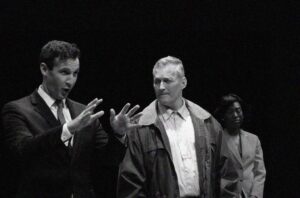
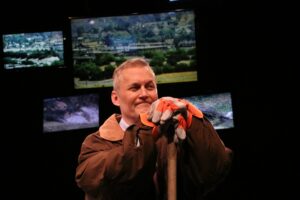
Have a fond or interesting memory of this play you’d like to share with us? We’d love to hear it!
Please Contact Us to Share!
Burning Coal Theatre
(919) 834-4001
224 Polk St., Raleigh NC 27604
Played October 11-28 2018: Stuff Happens
The Weir
The Weir by Conor McPherson
Dir. Jerome Davis
Dates: November 29-December 16, 2018
Location: Murphey School
Artistic Director’s Notes:
People often ask me: “Why so many Irish plays?” My answer is always the same: “When the Finns start writing great plays, I’ll start producing them!” And so we return again to the land of myth, blarney, rebellion…and drama. We understand that from the Irish spirit, these sometimes contradictory impulses arise. We celebrate the resilience of the people and of the land.
Burning Coal has now produced more plays by Conor McPherson (The Weir, St. Nicholas, The
Seafarer, Shining City —and those first two twice each) than any other playwright not named
William Shakespeare or David Edgar. Why? What draws us back to this writer? What draws me
back? He is considered among the best of his generation. He rose to fame during the ‘in yer face’
decade, when playwrights like Sarah Kane, Mark Ravenill and Martin McDonagh were creating
a catalogue of work filled with the most vile acts, displays of inhumane behavior violent and
visceral enough to make David Mamet blush. But in their midst there appeared this young writer from Ireland (26 when The Weir marked his declaration of significance in the English speaking theatre), intent on knocking his audience for a loop. But where Kane and Ravenill looked to the
bloody Jacobean model of Tourneur, Middleton and Ford, and McDonagh to American cinematic flashmasters like De Palma, Peckinpah and Tarantino, McPherson beat his own path.
His plays often begin with someone in a bind, forced into a corner of need, regret or desire. They
almost always hinge on a perceived supernatural event, and yet they aren’t ghost stories per se.
Or rather, they are hauntings of a different sort—where it isn’t entirely possible to work out who
is the haunted and who is the haunt. But unlike most, the dilemmas McPherson sets his characters in the midst of are always more internal, challenges that require a modification of the self. In St. Nicholas the besotted theatre critic arrives at a startling conclusion for a man of such self-regarding conceitedness: “Maybe wanting a conscience is the same thing as having one.”
In other words, rather than slicing his nemesis’ throat, he steps into his shoes. McPherson’s characters find a way to learn from those they most fear, to feel their humanity and often, in doing so, to cure themselves.
His most recent play, which is a strange kind of musical, filled with the lyrics and music of a great American curmudgeon, Bob Dylan, Girl From the North Country, reaches a similar
conclusion. Set in the US during the depression (before Dylan was born), it observes a collection
of drifters, con men, the mentally distressed and the given up, people fallen on their luck–in short, the Poor. When was the last time you saw that on television or in the movies? Each is muddling around, looking for a scapegoat for their own inadequacies and for the failure of their
government to provide an appropriate safety net…and somehow finding, through their collective struggle, their own better self. The accents are different, the blarney a touch less prolific, but the idea is the same as that in The Weir. McPherson is my guy, and I’m sticking with him!
Jerome Davis
Crew:
Stage Manager: Andy Hayworth
Technical Director: Greg Osbeck
Props: Elizabeth Newton
Lighting Design: Chris Popowich
Costume Design: Elizabeth Huddleston
Set Design: Tom Burch
Music Design: Sabrina Aldridge
Graphics Design and Social Media: Madison Murphey
Study Guide: Eric Kildow
Asst. Director: Danielle D’Angelo
Asst. Stage Manager: John Capetanos, Hannah Lafko, Courtney Pisano, Patrick Spain
Master Electrician: Lindsey Young
Asst. Master Electrician: Mia Carson, Glenn Sappie
House Manager: Carry Vaughan
Dialect Coach: Rebecca Bossen
Scenic Artist: Meredith Riggan
Asst. Scenic Artist: Cole Train
Cast:
Simon Kaplan – Jack
David Dossey – Finbar
Emily Rieder – Valerie
Lucius Robinson – Jim
Jordan Wolfe – Brendan
Jim Roof – Understudy
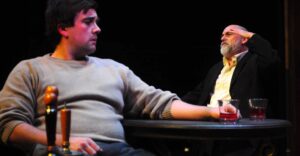
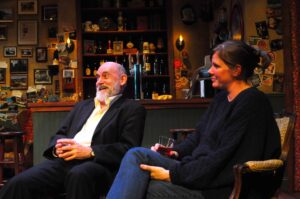
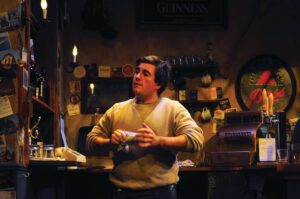
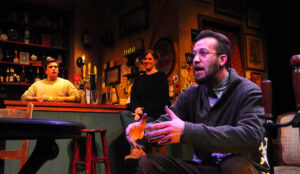
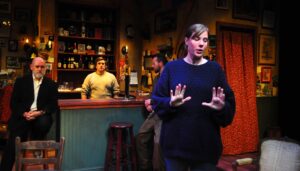
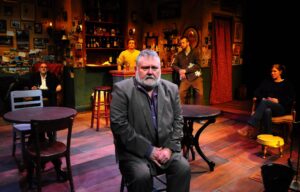
Have a fond or interesting memory of this play you’d like to share with us? We’d love to hear it!
Please Contact Us to Share!
Burning Coal Theatre
(919) 834-4001
224 Polk St., Raleigh NC 27604
Played November 29-December 16, 2018: The Weir
Ashe in Johannesburg
Ashe in Johannesburg by Hannah Benitez
Dir. Jerome Davis
Dates: January 24-February 10, 2019
Location: Murphey School
Artistic Director’s Notes:
1968 was an interesting year. To say the least. Assassinations of Dr. Martin Luther King, Jr. in
April, Robert F. Kennedy in June, the subsequent summer of rioting and the climatic clampdown
on progressive protestors outside the Democratic Convention in Chicago by the DINO, Mayor Richard Daley in August. It was truly a long hot summer. Hard on the heels of that unparalleled brutality directed entirely toward progressives (no one on the right or in the center caught a bullet or a baton that I know of), a young black man from Richmond, Virginia, arguably the “capital of the Confederacy” a scant century before, stepped onto the tennis court at Flushing Meadows,
New York and defeated, ironically, a Dutch tennis star, Tom Okker, to become the first Black man to win a ‘major’ in the history of the sport. A generation earlier, a black woman, also a citizen of the United States, Althea Gibson, had won not one but three major singles titles, so he was not the first African American to claim such a title, but for Ashe to have done what he did in
the late summer of 1968, of all years, strikes me as a sign that this was no ordinary man. Who among us would have been able to rise to such an occasion? Which of us would not have shrunk before glaring lights of the media and a rolling public that was, daily, seeing violence spilling
into the streets as the nation’s centuries old racial prejudices were brought to a head and the chasm between the haves and the have-notes was being made brutally clear on the killing fields of Vietnam. Yet there Ashe stood, his only weapon a tennis racket, his only commentary an icy
resolve to not lower himself into the depraved din. It was something his widower father had instilled in him and something that he would carry with him throughout his life, even into a most untimely and unnecessary death, the result of a tainted blood transfusion, just 25 years later as the AIDS epidemic was moving like a scythe through the nation and the world.
Shortly after his success at the US Open, Ashe applied to (and was denied) a visa to play in the South African Open, a non-major but a tournament highly regarded within the media and tennis circles. Three times he was denied a visa, but in the summer of 1973m the Afrikaner
government, largely of Dutch ancestry, abruptly relented ad allowed Ashe to participate. The boycott of South Africa was by then in full stride and many suggested to Ashe that he should join the boycott, that the Apartheid-based government there had decided that it would be politically advantageous to show the world the image of a renowned black man coming to their country without incident. Much pressure was placed on Ashe to withdraw his application. He went
anyway, based on his belief that it would be useful for the black South African people to see him up close, to believe that achievement was possible, that hope for a better world could be held.
I don’t know which of those ideas was the more moral, but I do know that I’m very glad that the person making the choice was a man named Arthur Ashe. Was he perfect? No. We have a
tendency to beautify celebrities. If they got one thing right, then they must be seen to have gotten
everything right, or we lose faith in them. Ashe wasn’t able to live up to that impossible standard. None of us can. But it does not lessen the importance of his achievements, foremost
among which I would suggest was his will to maintain civility in all situations. We coil use more of that in our public figures. Much more. And in the summer of 1968, when leaders were in very
short supply, and those who did stand up were getting shot down in our streets, a man named
Arthur Ashe walked onto the court and fought and won with dignity, passion and resole.
I don’t know the answer to that, of course, but I do know that I seriously began to consider that question for the first time in my life that night.
Out in the streets right now there are a lot of people asking that question of themselves and their neighbors. From the Arab Spring to the Occupy movement we are seeing ordinary people the world over, the quiet ones who for generations have been happy to make it through the day unnoticed, spilling into the streets. In the U.S. at least, violence has been minimal, thankfully, yet the windmills…er, I mean the powers that be…have strenuously insisted that the Occupiers have no purpose. Cervantes’ notion, I think, was that through an act of human will, of creative imagination, one might re-mold the world into something better. It seems to me much of the same idea that we’ve seen in the Occupy movement. Now that is a Quixotic idea if ever there was one. Gandhi had such an idea. So did Mandela. In each case, their Quixotic ideas have proven not just possible but the only way forward. There is no doubt in my mind that will ultimately prove to be the case again.
In fact, the past century has been a century full of Quixotic ideas. The humans could take flight. That the human voice might be recorded, and kept for posterity. That illnesses and disease might be wiped from the face of the earth. In America, we have raised up a middle class of such power, such wealth that all the world stands back in wonder. Labor unions rose, workers’ rights were fought for and achieved, women and minority populations have striven for and received something approaching equal rights, advanced education was extended to a wide swath of the population. In the early 70s we bought a corrupt President to resign, and ended a brutal war by marching in the street, by putting flowers in our hair.
Jerome Davis
Crew:
Choreography: Avis Hatcherpuzzo
Stage Manager: Garbeille Abrams
Technical Director: Greg Osbeck
Props: Elizabeth Newton
Lighting and Scenery Design: Matthew Adelson
Costume Design: Amani McKenzie
Sound Design: Juan Isler and David Ranii
Graphics Design and Social Media: Madison Doss
Study Guide: Eric Kildow
Asst. Director: Alex Procknow
Asst. Stage Manager: John Capetanos, Hannah Lafko, Alyssa Petrone, Courntney Pisano, George
Schlosser
Master Electrician: Mia Carson
House Manage: Carry Vaughan
Dialect Coach: Rebecca Bossen
Scenic Artist: Meredith Riggan
Board Operator: Lee Huddleston
Asst. Scenic Artist: Cole Train
Cast:
Preston Campbell – Man of Color 1, Boy On The Street (a boy of Soweto), Member of the white
Aristocracy, Zulu Warrior, Ron Karenga (an African American activist), Bob Foster (a light heavy weight boxer), Policeman 2
Maxine Eloi – Woman of Color 1, Amahle (an African woman with a London accent), Zulu
Welcome Woman 1 (a woman of Soweto), Pupil 1(a White South African man), Zulu warrior
(Male), Woman (a woman of Soweto), Policeman 1 (white male)
Juan Isler – Man of Color 2, Johnson (an African tennis official), Zulu Warrior, Pilot
Jackie Markahm – Woman of Color 3, Althea Gibson, Zulu Welcome Woman 3, Zulu Warrior (male), White South African Woman (at Stellenbosch), African Student (at UCLA), Chief of Police (White Male)
Joel Oramas – Arthur Ashe
Natalia Soto – Woman of Color 2, Journalist (a female student of the University of Soweto), Zulu
Welcome Woman 2, Pupil 2 (a White South African man), Zulu Warrior (Male)
Steven Roten – Frank Defrd, Hanekom
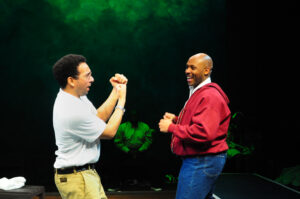
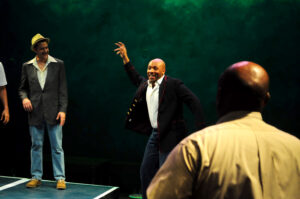



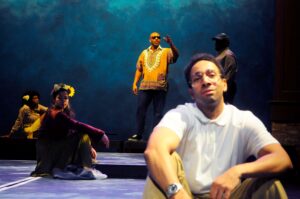
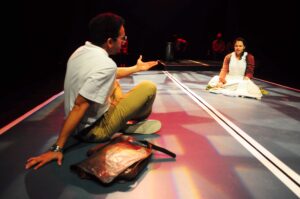
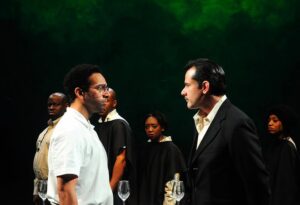
Have a fond or interesting memory of this play you’d like to share with us? We’d love to hear it!
Please Contact Us to Share!
Burning Coal Theatre
(919) 834-4001
224 Polk St., Raleigh NC 27604
Played January 24-February 10, 2019: Ashe in Johannesburg
The Great Celestial Cow
The Great Celestial Cow by Sue Townsend
Dir. Sonia Desai
Dates: April 11-28, 2019
Location: Murphey School
Artistic Director’s Notes:
The ideas in The Great Celestial Cow seem like ones that should be shared by all reasonable humans. If you believe the Vikings laying waste to villages to take what they wanted, without concern for the feelings or rights of the villagers is a good model, them perhaps these arguments will not resonate with you. If you believe that Wall Street speculators, perpetually scamming clients for a few pennies more is a noble breed, then maybe the play will feel like a trifle.
Recently I was listening to a podcast in which a member of the mainstream media argued against the podcast’s fanciful idea that MSM has a responsibility foremost to the truth (imagine that).
His retort was “If you don’t take into account the corporation’s need to make a profit, then you
are no different than “a child asking to drive Daddy’s Car”. In other words, we’ll do whatever we want —so sit down and shut up. I bet (to paraphrase Molly Ivins) that sounded better in the
original ‘Viking’. When I first read the play bac kin 1985, I was drawn to it by the title. The Great Celestial Cow seemed whimsical and fascinating. So I trotted home from the Drama Book Shop, plopped down on my $75 futon and devoured it. It is both those things, but so much more.
In the play, the writer imagines a family torn apart by the overwhelming pressure generated by
the kind of global economic disparity that is now even more in evidence. In the 1970s (and really, through history), in many parts of the world, economic security could only ever be
attained, or so it seemed, by moving Westward (or if you grew up in the rural US, Northward). As the bank robber, Willie Sutton is said to have uttered when asked why he robbed banks: “That’s where the money is.” But why is that “where the money is?” During the great industrial
revolution, there was an excuse. Cities had to be built near shipping lanes so that the resources to
fuel the economy could be accessed. Today, there is no excuse. “The money” could be anywhere, yet it continues to exist in isolated areas that bear almost no resemblance to the rest of a given country’s landscape or character. To achieve, to feel part of the world, that is where you must go.
Generations found the only avenue for advancement was a move to a place that meant nothing to them, that had no semblance of their culture, their roots, the iconography of their upbringing. “Oh, how I wanna go home,” the song goes. But for millions going home means going broke, hungry, unfulfilled. For many it meant and means giving up on anything but the most meagre of existences. In the great cities, we were told, culture awaits. But whose culture? And at what cost? This play asks us to consider this.
In The Great Celestial Cow, we meet Sita, uprooted from her land, people and costumes. In
being so displaced, she is forced to find in herself a strength she didn’t know she had. In that strength, she is able to catch a glimpse of what might have been, had human decency rather than
greed been the organizing principle of her species, her times, our world.
Jerome Davis
Crew:
Stage Manager: Gabrielle Abrams
Technical Director: Greg Osbeck
Scenery Design: Elizabeth Newton
Lighting Design: Maranda Debusk
Costume Design: Neena Rai
Props Design: Danielle James
Sound Design: Juan Isler
Graphics and Social Media: Madison Doss
Study Guide: Eric Kildow
Asst. Director: Brennan Tutterow
Asst. Stage Manager: John Capetanos, Courtney Pisano
Master Electrician: Mia Carson
House Manager: Carry Vaughan
Dialect Coach: Rebecca Bossen
Scenic Artist: Meredith Riggan
Graphics Design: Madison Doss
Asst. Scenic Artist: Cole Train
Cast:
Snehal Bhagwat – Mother-in-law (Dadima), Kishwar
Kelly Buynitzky – Official, Rachel, Liberal, Nurse, Auctioneer
Joey DeSena – Official, Martin, Stallholder, Dr. Mistry, Harold
Deepak Dhar- New Owner, Raj, Asian Elder
Seem Kukreja – Sita, Classical Indian Dancer
Maneesha Lassiter – Daheba, Stewardess, Fat Auntie (Masi), Sarla
Darius Shafa – Prem, Old Age Pensioner, Cow in Field
Priya Singh – Bibi, Cow in Nativity
Pimpila Violette – Goddess, Lila, Indira, Ram, Muslim Girl (Zhora), Rose
Anu Virkar – 2nd Fat Auntie, Antia, Mr. Patel, Cow Photographer

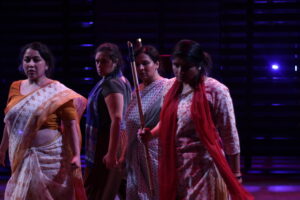
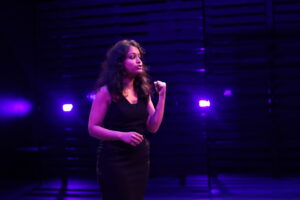
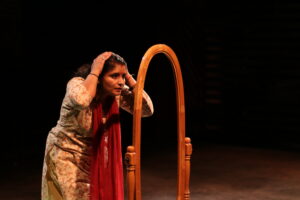
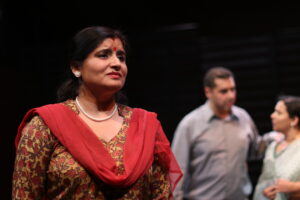

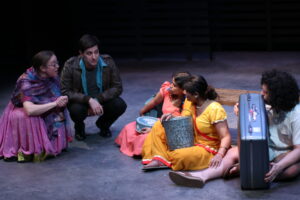
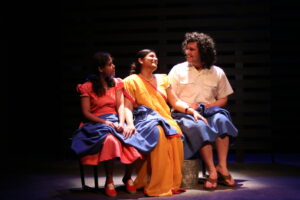


Have a fond or interesting memory of this play you’d like to share with us? We’d love to hear it!
Please Contact Us to Share!
Burning Coal Theatre
(919) 834-4001
224 Polk St., Raleigh NC 27604
Played April 11-28, 2018: The Great Celestial Cow
Season 23: (2019-2020)
The Container
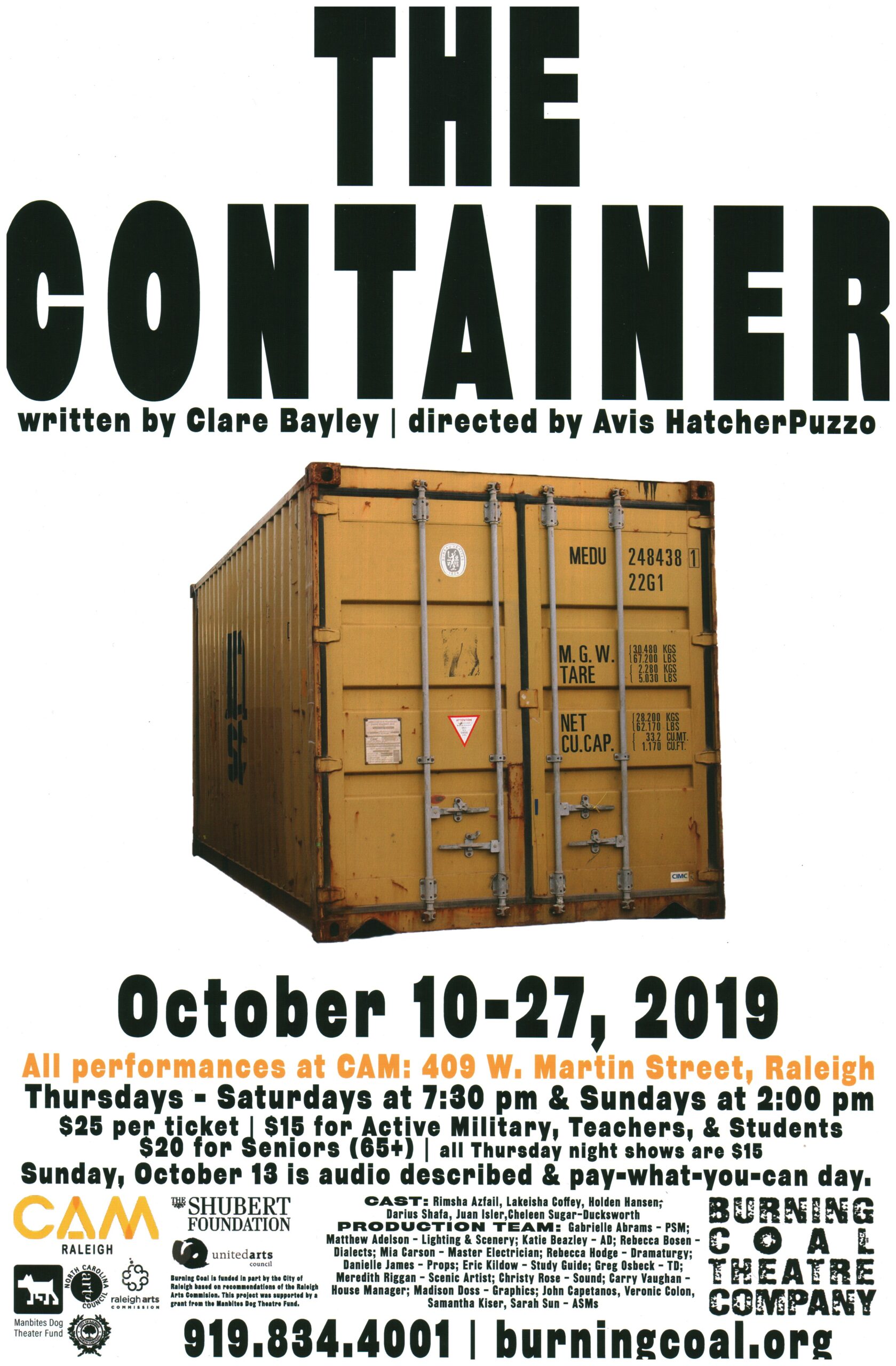
The Container by Clare Bayley
Dir. Avis HatcherPuzzo
Dates: October 10-27, 2019
Location: CAM Raleigh
Camelot
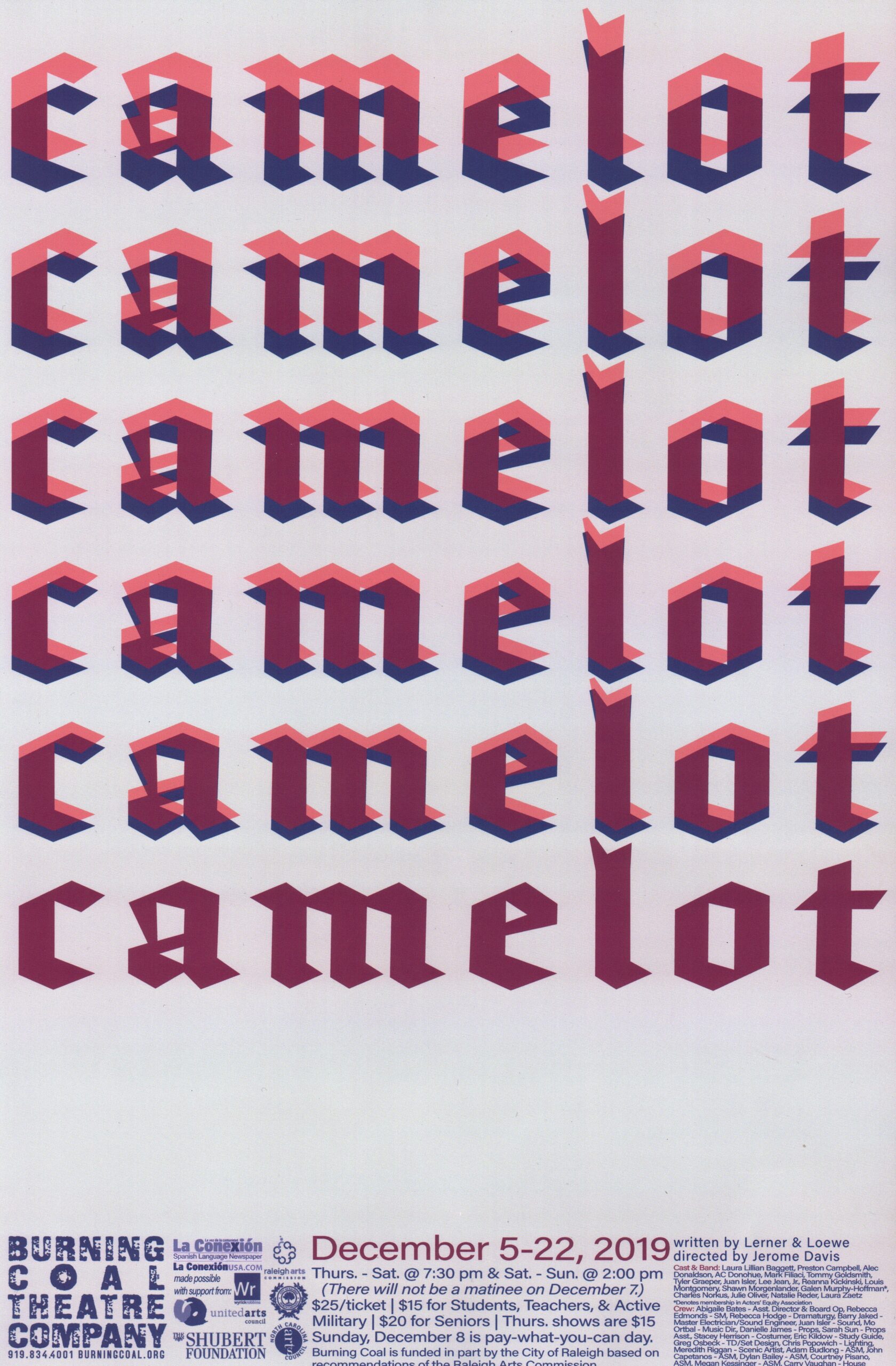
Camelot by Lerner & Lowe
Dir. Jerome Davis
Dates: December 5-22, 2019
Location: Murphey School
Talley's Folly
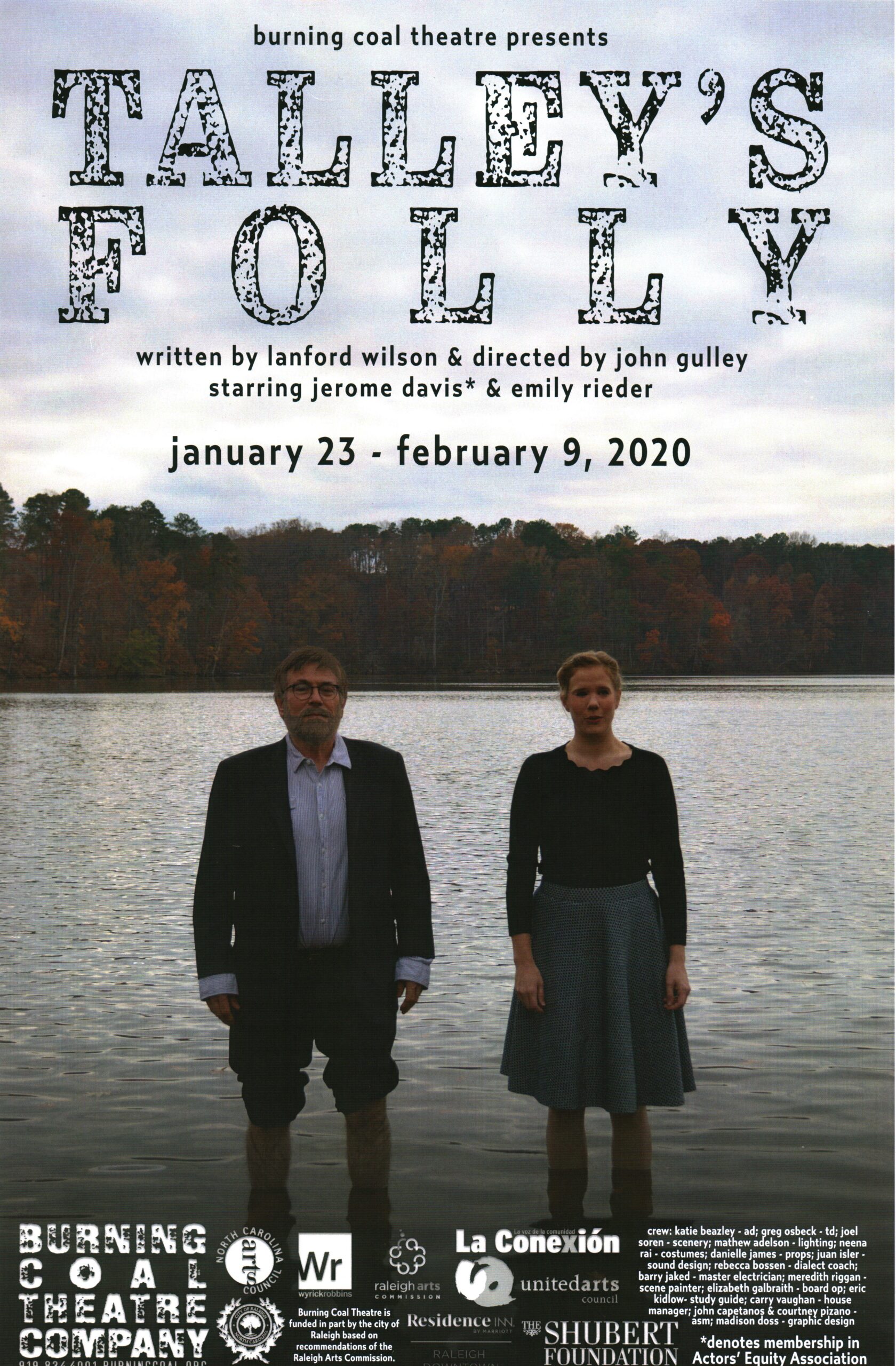
Talley's Folly by Lanford Wilson
Dir. John Gulley
Dates: January 23-February 9, 2020
Location: Murphey School
The Container
The Container by Clare Bayley
Dir. Avis HatcherPuzzo
Dates: October 10-27, 2019
Location: CAM Raleigh
Artistic Director’s Notes:
A long time ago in a galaxy far, far away there were strange creatures who lived by, or at least,
claimed to live by a mantra, an incantation that went something like this: “Do unto others as you would have the do unto you.” I think I got that right. I also vaguely recall “To whom much is
given, much is expected.”
As a boy, I remember being told over and over by my elders, “That won’t work, we’ve already
tried it.” It’s a deflating idea for a young person to hear, but hard to argue. We were told “Doing
the same thing over and over, expecting a different result is the sign of insanity.” In other words,
if we couldn’t make it work, you shouldn’t try.
But that was then, this is now. Today we live in a country, the only country on earth in which the
bottom half of the population has seen a decline in its net worth over the last forty years (about two generations). The overall GDP continues to sail upward, Wall Street booms, real estate soars, the cost of tickets to a Broadway show…well, don’t get me started! How can those two things exist in the same marvelous universe? The answer is fairly clear, it can exist if the upper half of the population has decided to discard the lower half, to continue to suck the marrow from our Democratic Republic until the skeletal system collapses into a heap of chalky bones.
I heard it best described once by an accountant, of all people. He explained that his business model was to charge a bit more each year for the same service. Ultimately, that would mean that he’d have fewer clients (read: less work) and would earn more profit from that less work. So
good for him! But bad for his clients, bad for anyone who needed his service. That, it seems to
me is precisely the model that has created such income disparity in our country today. When this wanton disregard for our fellow human beings happens, the obvious behavior for the have-nots would seem to be to turn on the ones who are the cause of their economic downfall.
But that does not seem to be happening. Instead, disdainful and possibly murderous eyes are
turned toward those with even less power, the indigent, the physically or emotionally scarred,
the immigrant, wrenched from their home (imagine that…if you can), and forced by circumstances far beyond their control to literally run for their lives. That’s not a logical
response. Unless of course that upper echelon of Haves are using their wealth to manipulate the
thinking of the Have-Nots. Hmm. What mechanism might they use to do that? I’m stumped.
Somewhere in the universe perhaps there exists a people that, when asked for assistance, for
charity, for understanding and patience and a welcome place to lay their head, would respond
with grace, goodness, generosity and humanity. That universe seems far from the America I
know today. Instead of revering the Golden Rule and holding it firmly, shouting it loudly as our
first principle, we mock it, joke about it, cast a sardonic eye upon anyone who would publicly
suggest such a philosophy. Instead, we are told, “Hey, they’re in business to make money!” or we’re given pithy acronyms like NIMBY (not in my back yard) or we’re told that “socialism has never worked anywhere on earth.” To which the radical youth in me wants to scream back, “No!
You have never made it work. Move over. It’s my turn now.” If the richest country on earth can’t find a way to do unto others…then it’s time for change. Radical change. The fact that one couldn’t make that work means nothing, really, except that it’s time for a change.
Jerome Davis
Crew:
Stage Manager: Gabby Abrams
Technical Director: Greg Osbeck
Scenery and Lighting Design: Matthew Adelson
Costume Design: Neena Rai
Props Design: Danielle James
Sound Design: Christiana Rose
Graphics Design and Social Media: Madison Doss
Study Guide: Eric Kildow
Asst. Director: Katie Meazley
Asst. Stage Manager: Dylan Bailey, John Capetanos, Sarah Sun
Master Electrician: Mia Carson
House Manager: Carry Vaughan
Dialect Coach: Rebecca Bossen
Scenic Artist: Meredith Riggan
Asst. Scenic Artist: Cole Train
Cast:
Rimsha Afzal – Maria
Lakeisha Coffey – Fatima
Holden Hansen – Ahmad
Juan Isler – The Agent
Darius Shafea – Jamal
Cheleen Sugar- Asha
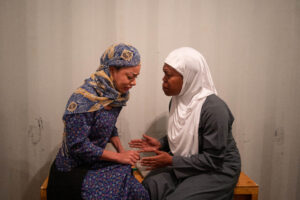
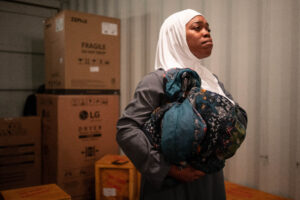
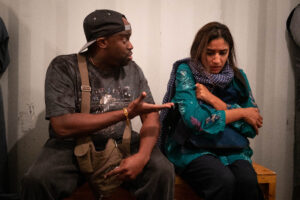
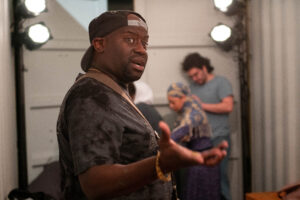
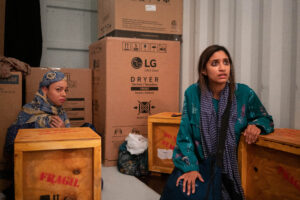
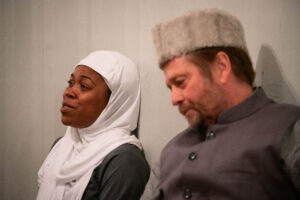
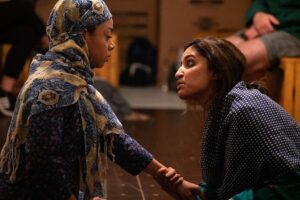
Have a fond or interesting memory of this play you’d like to share with us? We’d love to hear it!
Please Contact Us to Share!
Burning Coal Theatre
(919) 834-4001
224 Polk St., Raleigh NC 27604
Played October 10-27, 2019: The Container
Camelot
Camelot by Lerner & Lowe
Dir. Jerome Davis
Dates: December 5-22, 2019
Location: Murphey School
Artistic Director’s Notes:
The story of Arthur has fascinated us for centuries. From Malory’s Le Morte’s Arthur to Scott’s The Lady of the Lake to TH White’s Great The Once and Future King to John Boorman’s flawed Excalibre (and a bunch of far more flawed films that sought to harvest gold from swordplay and romance while plowing under the political aspects of the story), the tales of Arthur, Merlyn, Jenny & Lance have delighted and inspired generations. I had a college professor who insisted that she wouldn’t let anyone into her house…unless they have read The Once and Future King. I had a lifetime pass. It was and is my favorite ‘modern novel.’
I remember in high school, auditioning at various festivals with Arthur’s speech near the end of Act I. What a pompous ass they must have thought of me, swinging my imaginary sword and decrying those words, steeped in loss and the weight of experience, neither of which I had known
much of to that point.
Well, we’ve all known loss of late, haven’t we? Some more than others, of course, but we all
know the bitter taste of dreams unrealized, of battles never started, much less won, of ideals
grown overripe and dead on the vine (I’m looking at you, babyboomers!). In Camelot we learn of
a young man who had no idea he was capable of leadership for the simple reason that no one told
him so. They had all tried to pull that sword from the stone, and failed, and complained that it
was impossible. But Arthur could because of two factors: first, he was educated (by Merlyn, the
surly old magician who lived his life backward and so knows–if he can only remember–all the
mistakes we might make), and second, because he didn’t know he couldn’t. In White’s book, the boy stands alone in the square, the town gathered miles away to celebrate the elevation of another, Arthur’s half-brother, to knighthood. Being a bit of a lazy kid, Arthur wonders if that
sword sticking in the stone there, looking like a perfectly good sword, couldn’t be used in Sir
Kay’s knighting (and save him a longer trip home to find the sword Kay forgot to bring). So he walks up, grips it, and hears a noise. He is not alone in the courtyard. All along the rooftops sit the animals, fowl and fishes that Arthur met in his unique tutelage with Merlyn. Arthur looks to
them for help, for guidance, but unlike in the past, this time they only stare back. Unsure of what to do, Arthur acts. He clasps the sword handle, and out of the rock it comes. Now he is there, in that exalted position of leadership. Now what?
Well, that is the question, isn’t it? Now that we are at a place in time when we have control of at
least some part of the system of communications, now that we have created a tool to make our voices heard…now that social media has created a platform for all of us to speak, what’s next?
The ones clinging to power want to use it to smear those who dare voice objection to decades of misrule, to create McCarthyite ‘enemies’ that require no actual effort on their part to combat, to imprison, torture and I fear even kill those who use the brave-new-world tool to expose their misdeeds. Some seem to want to use that platform to spread lies, others want to use it to hawk their products. Arthur uses his power to (try to) build a ore democratic society, a round table where no voice is elevated above another. It is an extraordinary act of faith in his fellow human
beings. Did he succeed? Spoiler Alert: Not yet.
Jerome Davis
Crew:
Music Director: Mo Ortbal
Stage Manager: Rebecca Edmonds
Scenery Design/Technical Director: Greg Osbeck
Lighting Design: Christopher Popowich
Costume Design: Stacey Herrison
Props: Danielle James
Sound Design: Juan Isler
Graphics Design & Social Media: Madison Doss/Daniel Wasserman
Study Guide: Eric Kildow
Asst. Director: Abigaile Bates
Dramaturg/Board Operator: Katie Beazley
Asst. Stage Manager: Dylan Bailey, Adam Budlong, John Capetanos, Megan Kessinger,
Courtney Pisano
Master Electrician & Sound Engineer: Barry Jaked
Props Asst.: Sarah Sun
Costumes Asst.: Marjorie Bass
House Manager: Carry Vaughan
Scenic Artist: Meredith Riggan
Asst. Technical Director: Maddison Eberle
Asst. Scenic Artist: Cole Train
Cast:
LauraLillian Baggett – Tom, Gilliam, Knight
Preston Campbell – Sir Lionel
Alec Donaldson – Pellinore
AC Donohue – Morgan Le Fay
Mark Filiaci – Sir Dinadan
Tommy Goldsmith – Guitarist, Page, Knight
Tyler Graeper – Lancelot
Juan Isler – Sir Sagramore
Lee Jean, Jr. – Tom, The Voice, Dap, Knight
Shawn Morgenlander – Mordred, Lady Sybil
Louis Montgomery – Bass, Knight
Galen Murphy-Hoffman – Arthur
Charles Norkus – Drummer, Clarius
Julie Oliver – Merlyn/1st Lady in Waiting/Lady Anne
Natalie Reder – Guenevere
Laura Zaetz – Tom, Herald, Knight
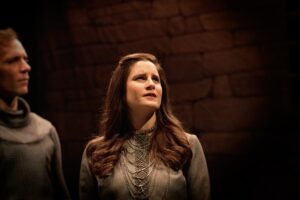
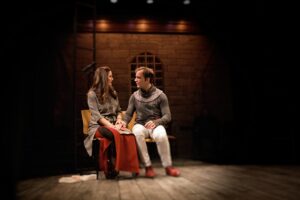
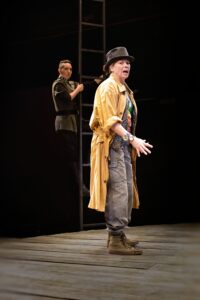
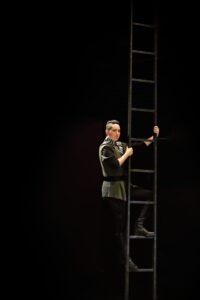
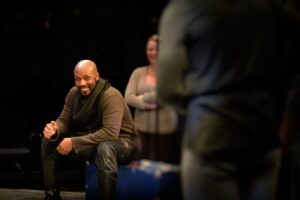



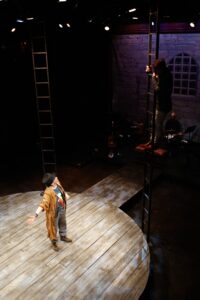
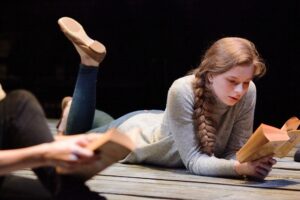

Have a fond or interesting memory of this play you’d like to share with us? We’d love to hear it!
Please Contact Us to Share!
Burning Coal Theatre
(919) 834-4001
224 Polk St., Raleigh NC 27604
Played December 5-22, 2019: Camelot
Talley's Folly
Talley’s Folly by Lanford Wilson
Dir. John Gulley
Dates: January 23-February 9, 2020
Location: Murphey School
Artistic Director’s Notes:
Matt Friedman and Sally Talley are a fine pair.
For each, they received their education at the School of Hard Knocks. Each was raised in the
standard way, to believe a particular thing, unquestioningly. Each found out the hard reality that blind acquiescence to a country, a flag, an ‘ism’ is a good way to lose life, limb, self-respect, the things held most dear. I fell in love with Talley’s Folly about the time most people know it did in
the early 1980s. A ‘formative’ time in my life for sure. College. Out on my own. Learning the
ropes. Then this play appeared, raging, and I became swept up by it. I distinctly remember
performing a scene from it in an acting class at university and feeling, with the saying of those
beautifully wrought lines, a kind of power and focus that I’d not felt before. I had spoken Shakespeare in High School (well, more or less), and felt in the presence of a witty lyricist, but with this play, I felt the presence of a brilliant character. And the feeling, the understanding, the
faith that I could be that character made the decision to pursue a life in the theatre pretty easy.
How does Wilson do it? Most of the language spoken in the play is homespun, simple,
downhome talk. Talk about rivers, and houses, woods, willows, and old dogs that bay. He
doesn’t bombard us with a slew of high-fallutin’ words. Well, some. Strategically placed. Ut
Lanford Wilson’s intention in this paly is not to show us how smart he is. No, he does something much more clever: He sets the play in a palace where education, intelligence, knowledge itself is frowned upon, and he immerses the characters in that place. He could have made Matt an Ivy Leaguer just passing through. He could have made Sally a black sheep of the family from the get-go, someone constantly straining against the boundaries of ‘polite society.’ but instead, he chose to make each character brilliant in ways that they themselves don’t recognize, so immersed in that idle class, centrist culture are they. They are of the land.
Yes, Matt is first-generation, but
so what?; Yes, Sally is now viewed with disdain, but that’s a recent development. Their original selves, their core selves, is as much a part of the Missouri landscape as anyone else’s. And
then…Wilson lets what always does happen when two such souls collide: magic! As another
great, Man of the People once sang, Sparks fly on Main Street. Or at least on the dock of an old
boathouse, dilapidated, run-down, not thought of at all by those caterwauling elites who want to pretend that people from this part of the county are Fly Over People, insignificant.
Those of us who came from such a background know the feeling. We’ve also stood there, mouth
agape as that person walked in. The language flies like sparrows in flight, the head clears,
everything, everything becomes fodder for the poet, and a new person draws. The person is you,
the real you. Or maybe they aren’t new at all. Maybe they were there all along. Whatever the
case, you gulp in the air, step forward, and begin again. But this time…you aren’t alone.
And nothing, nothing could be finer.
Jerome Davis
Crew:
Stage Manager: Rebecca Edmonds
Scenery Design/Technical Director: Greg Osbeck
Lighting Design: Matthew Adelson
Scenery Design: Joel Soren
Costume Design: Neena Rai
Props: Danielle James
Sound Design: Juan Isler
Graphics Design & Social Media: Madison Doss / Danel Wasserman
Study Guide: Eric Kildow
Asst. Director: Katie Beazley
Asst. Stage Manager: Dylan Bailey, John Capetanos, Megan Kessinger, Courtney Pisano, Sarah
Sun
Master Electrician: Barry Jaked
House Manager: Carry Vaughan
Scenic Artist: Meredith Riggan
Asst. Technical Director: Maddison Eberle
Asst. Scenic Artist: Cole Train
Cast:
Jerome Davis – Matt Friedman
Emily Rieder – Sally Talley
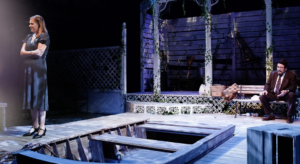
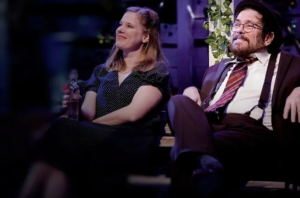
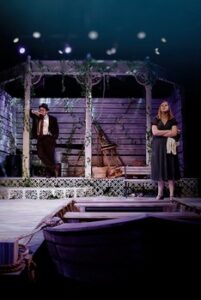
Have a fond or interesting memory of this play you’d like to share with us? We’d love to hear it!
Please Contact Us to Share!
Burning Coal Theatre
(919) 834-4001
224 Polk St., Raleigh NC 27604
Played January 23-February 9, 2020: Talley's Folly
Season 24: (2020-2021)
A Hundred Words for Snow
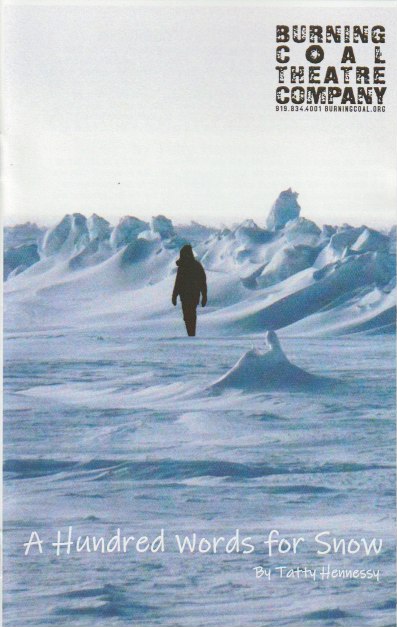
A Hundred Words for Snow by Tatty Hennessy
Dir. Jerome Davis
Dates: October 8-25, 2020
Location: Murphey School
Conversations I Always Wanted to Have: Until the Flood and Forever
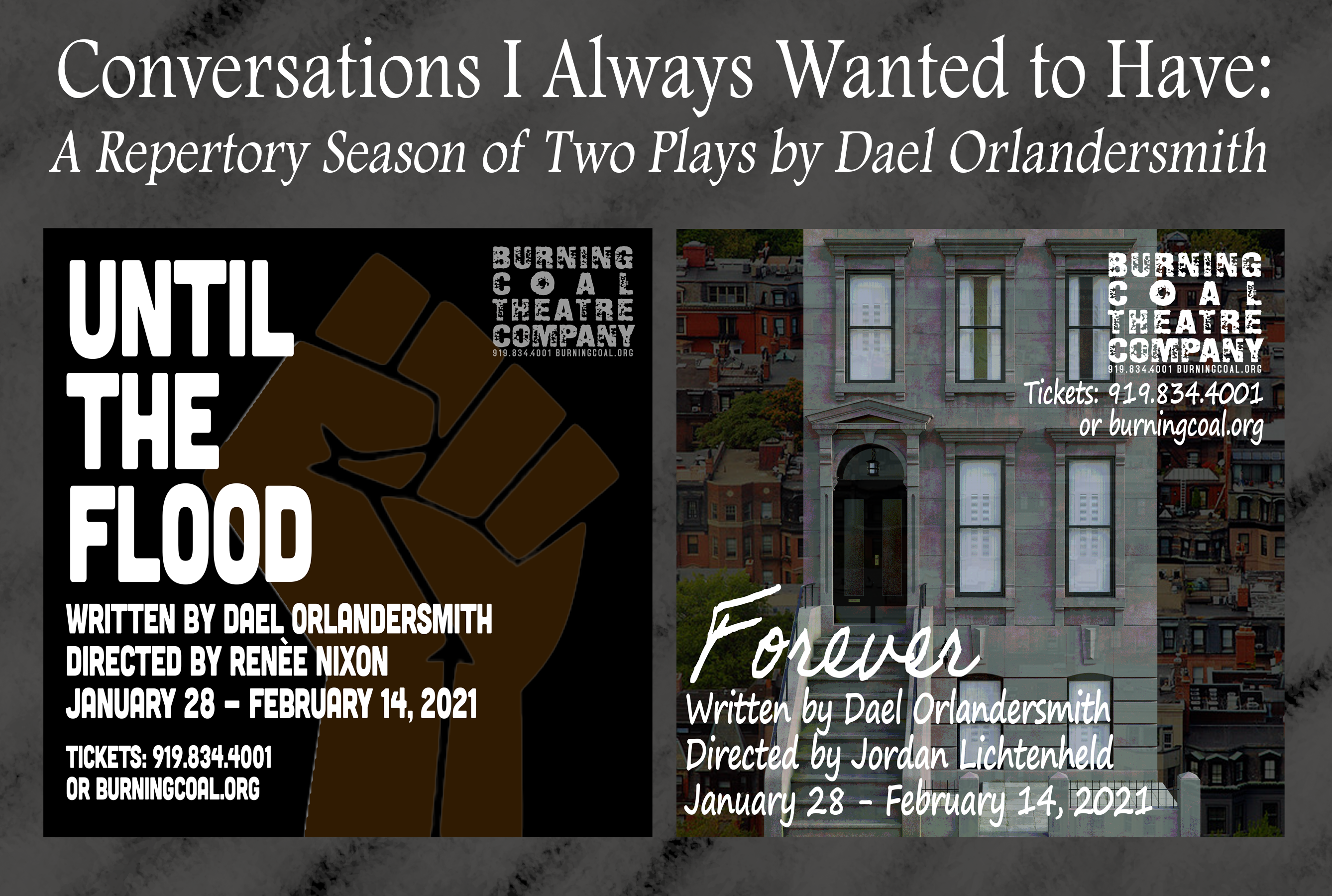
Conversations I Always Wanted to Have: Until the Flood and Forever by Dael Orlandersmith
Dir. (Until the Flood) Renee Nixon
Dir. (Forever) Jordan Litchenheld
Dates: January 28-February 14, 2021
Location: Murphey School
Evita
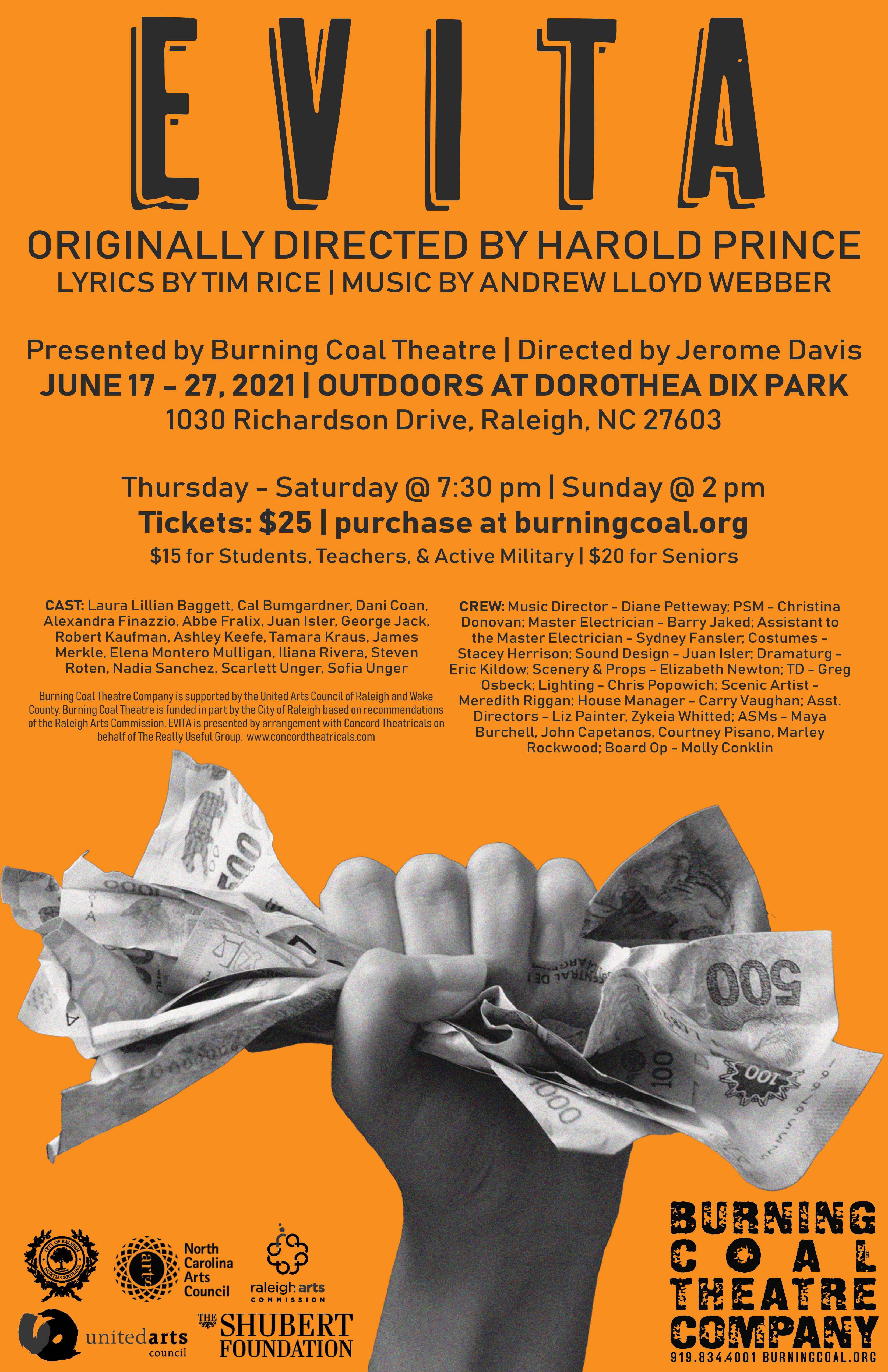
Evita with book by Tim Rice and composed by Andrew Lloyd Webber
Dir. Jerome Davis
Dates: June 17-27, 2021
Location: Dorothea Dix Park
A Hundred Words for Snow
A Hundred Words for Snow by Tatty Hennessy
Dir. Jerome Davis
Dates: October 8-25, 2020
Location: Murphey School
Artistic Director’s Notes:
We are delighted to have everyone here with us for this, beginning of the 24th Burning Coal
season in Raleigh. We had been planning a somewhat different season, but A Hundred Words for Snow was definitely going to be our season opener. Because it is a one-person show, we feel that we can safely present it to you and we ask, right up front, that you please, please be safe throughout your 75 minutes here in the building. Wear that mask! Keep distanced from the other audience and the actor. Make liberal use of the hand sanitizer. And try not to touch and surface
that you don’t need to touch. We will bring you in the building one at a time, and we will ask you to leave the same way.
People are always asking me, “Why this play? Why now?” I find it a bit odd that no one ever says to, for instance, the “Marvel Universe,” “Why the Avengers? Why now?” It is almost as if the not for profit sector is expected to justify its existence because some of us receive public subsidy. This neglects the fact that the film, television and music industries receive exponentially
more public subsidy than does the arts. Do you really believe that Jimmy Buffett paid for the Walnut Creek Amphitheatre (or whatever its called now)? Of course not. You paid for it. Jimmy
just makes copious use of it whenever it suits his and his record company’s needs. That said, I do think there is a good reason to do this play and do it now. In it, you will hear the story of a young person who looks around, sees that things are not as they should, and acts to do something about
it. We live in a time when the halcyon ideals of the Summer of Love have calcified, during the lifetimes of those who led that movement, into a hard, ugly, ‘us and them’ mentality. Recently, one of our esteemed leaders was heard to say “We will take whatever action needed to remedy
the situation. And if the law doesn’t support that, we’ll change the law.” This is not the way
civilized people think, let alone people who believe in the ideas and ideals of the 1960s. It is,
frankly, a dog-eat-dog, every man for himself mentality. And frankly, we should be ashamed for tolerating it, even for a moment. So here’s a little play about a possible way out. Spoiler alert: it
involves not talking about, not posting about, not tweeting about, but actually doing something.
In the coming year, we’ll be presenting two more one-person shows, both by the brilliant and
severely under-produced African American writer Dael Orlandersmith. Those plays, Forever and
Until the Flood will be done live on our stage here at Burning Coal, but in order to get the most people ‘in’ to see the plays, they will be live streamed over the internet without a live audience in
attendance. Then we will close our season in the spring with a concert version of the Webber & Rice classic, Evita. We’ll be doing it outdoors. We’ll be distancing still (if needed) and we will
be rocking the house if we can. Who knows what lies ahead. But any journey begins with a first step.
Jerome Davis
Crew:
Stage Manager: Megan Kessinger
Scenery/Lighting/Technical Director: Josh Martin
Costume Design: Stacey Herrison
Props: Elizabeth Nelson
Sound Design: Nikolas Parnell
Graphics Design and Social Media: Madison Doss
Study Guide: Eric Kildow
Asst. Director: Carry Vaughan
Board Operator: Madison Doss, Elizabeth Galbraith
Asst. Stage Managers: Jordan Britt, John Capetanos, Courtney Pisano
Costumes Asst.: Grace Bianco
House Manager: Carry Vaughan
Scenic Artist: Meredith Riggan
Asst. Scenic Artist: Cole Train
Cast:
Laura Lillian Baggett and Kimmy Fiorentino (alternating performances) – Rory

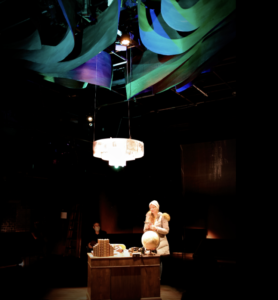


Have a fond or interesting memory of this play you’d like to share with us? We’d love to hear it!
Please Contact Us to Share!
Burning Coal Theatre
(919) 834-4001
224 Polk St., Raleigh NC 27604
Played October 8-25, 2020: A Hundred Words for Snow
Conversations I Always Wanted to Have: Until the Flood and Forever
Conversations I Always Wanted to Have: Until the Flood and Forever by Dael Orlandersmith
Dir (Until the Flood): Renee Nixon
Dir. (Forever): Jordan Lichtenheld Randy
Dates: January 28-February 14, 2021
Location: Murphey School
Artistic Director’s Notes:
Dael Orlandersmith’s work is new to me. I knew of her but had never explored her work until last summer. Because of our constant companion, the pandemic, it was a ‘down time’ for many
of us in the arts, and I imagine a lot of artistic directors were doing what I was doing, opening new doors, venturing into unexplored corners of our world, and planning. And there she was. My
first experience with Dael was reading her play Forever. It hit me with a wallop and left me wondering how a woman from East Harlem could have known so many of the same experiences
that I have known in my life. And how, having been born within a few months of me, in the
same country and in the same time zone, could have also known so many bad times that were beyond my capability to imagine. The word ‘forever’ lingers above all of us in the arts. For each of us,
the goal, the dream, the plan is to make a mark on the world. And yet, somewhere in the back of all our minds is the understanding that nothing is forever. That no matter how impactful our life is, eventually we will be forgotten. Dust in the wind, as the song goes. And so Orlandersmith has written about a woman (not the show’s heroine) who wanted to be an artist, who wanted to be
great, who wanted to be known …but who, because of life’s horrible truths for an African
American woman growing up in the middle part of the 20th century, was forced to bury those dreams deep within herself. When that is done to a person, what horrors may result? For the
play’s heroine, the unfortunate answer is terrible. For the rest of us, it is the vague unease of sensing that something else was possible. Something else could have been, instead of what is.
So, I am delighted to bring you both of these plays by Dael Orlandersmith. One is about the most
personal damage that can be done to a person, the severing of the tie that binds us to our mother. The other is about a more public damage: the severing of faith in our institutions. On some level, both plays ask the same question. When that breakage occurs, what then? And why do we fight so hard to avoid accepting the need for a new way forward, a way that rejects the ugly parts of the past in favor of a tomorrow that might be worth preserving forever.
Jerome Davis
Crew:
Lighting Design: Matthew Adelson
Scenery Design: Nadir Bey
Sound Design: Juan Isler
Costume Design: Elena Montero Mulligan
Props Design: Elizabeth Newton
Master Electrician: Barry Jaked
Study Guide: Eric Kildow
Assistant Directors: Sarah Hogewood, Marley Rockwood
Video Director: David Ray
Board Op: Noah Zimmerman
Asst. Stage Managers: Emily Johns, Germona Sharp, Tameka Tisdale, Noah Zimmerman,
Scenic Artist: Meredith Riggans
Technical Director: Greg Osbeck
Assistant to the Scenic Artist: Cole Train
Camera Operators: Natalie Overton, Nadia Sanchez
Intimacy Director: Jeff A. R. Jones
Theatre Therapist: Cameron Wade
Cast:
Cast (Forever): Emilia “Me-Me” Cowans-Taylor
Cast (Until the Flood):
Byron Jennings
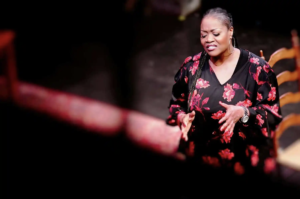
Have a fond or interesting memory of this play you’d like to share with us? We’d love to hear it!
Please Contact Us to Share!
Burning Coal Theatre
(919) 834-4001
224 Polk St., Raleigh NC 27604
Played January 28-February 14, 2021: Conversations I Always Wanted to Have: Until the Flood & Forever
Evita
Evita with book by Tim Rice and composed by Andrew Lloyd Webber
Dir. Jerome Davis
Dates: June 17-27, 2021
Location: Murphey School
Artistic Director’s Notes:
Lots going on in the world, as we come out of a 15 month long collective tableau. Gas becomes scarce so the price goes up. Lumber is in great demand, so the price goes up. Skilled workers are in demand, so their salaries…remain static. The pandemic is still claiming lives, the hucksters peddling opioids to poor working men and women remain unprosecuted as the bodies pile up;
governments that seemed headed in a progressive direction continue the same imperialist bent as
their predecessors; our friends in the media continue to take sides rather than trying to, you know, inform us; the budgets for the most destructive aspects of our society continue to
skyrocket while those who work against that destruction are imprisoned, silenced, harassed. In short, business as usual. Except that it isn’t. Because somewhere in the midst of all that
normality, a series of unnecessary and brutal acts cast into sharp relief the difference between the haves and the have-nots in our society, and a generation rose up in protest. Did some of them go too far? Yes. But when you compare that to, oh, for instance, the unlawful invasion of a sovereign country on trumped up charges, the embargo and starvation of an entire population in order to wrest control of their oil fields or the funding of an apartheid regime to the tune of about twice the amount of money it would take to end homelessness in our country, then yeah, it doesn’t seem like those who went too far went too far.
So, then, let’s look at Eva Duarte, a young woman born on the wrong side of the tracks (maybe even on the tracks), who, in the first half of the 20th century miraculously found a way to scratch and claw her way to the exalted position of Most Powerful Woman on Earth by simply
acknowledging the plight of her fellow poor, downtrodden, mostly rural and often indigenous peoples. That’s all it took. An acknowledgement. And they rallied behind her in breathtaking numbers that caused the powerful elites to quake and, at least for a time, to yield. Of course Eva did not stay Santa Evita for long. The pressures of power, success, wealth, and knowing that long
entrenched forces within her husband’s government, military and the international business community were working stealthily (read: cowardly) behind their backs to overthrow the regime and bring down the sainted Evita was too much. Her “little body” gave out, yes, but before it her iron will that had said “We shall have what is ours!” was replaced, as so often in the case with “I will take what I can get.” Eva’s story, then, is a story not just for 1950s Argentina, but also a message for all those today who would rise up and try to take power from the powerful.
Jerome Davis
Crew:
Stage Manager: Christina Donovan
Music Director: Diane Petteway
Technical Director: Greg Osbeck
Lighting Design: Chris Popowich
Scenery and Props Design: Elizabeth Newton
Sound Design: Juan Isler
Sound Operator: Micah Meizlish
Costume Design: Stacey Herrison
Video Design: Josh Martin
Master Electrician: Barry Jaked
Study Guide: Eric Kildow
Asst. Directors: Natalie Overton, Liz Painter
Board Operator: Molly Conklin
Asst. Stage Managers: Maya Burchell, John Capetanos, Caroline O’Dekirk, Courntey Pisano
Asst. Lighting Design: Sydney Fansler
Scenic Charge Artist: Meredith Riggan
House Manager: Carry Vaughan
Asst. Scenic Artist: Cole Train
Musicians:
Julie Bradley (Synthesizer), Ed Butler (Drums), Bernie Petteway (Bass), Diane Petteway (Piano)
Cast:
Laura Lillian Baggett – Ensemble
Cal Bumgardner – Ensemble
Dani Coan – Ensemble
Tamara Farias – Ensemble
Alexandra Finazzio – Ensemble
Abbe Fralix – The Mistress
Juan Isler – Ensemble
George Jack – Magaldi
Robert (Bobby) Kaufman – Ensemble
Ashley Keefe – Ensemble
James Merkle – Ensemble
Elena Montero Mulligan – Ensemble
Illiana Rivera – Eva Duarte Peron
Steve Roten – Peron
Nadia Sanchez -Ensemble
Scarlett Unger- Ensemble
Sofia Unger – Ensemble

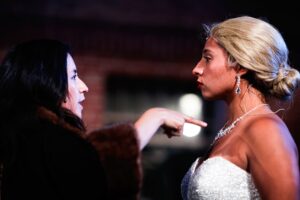
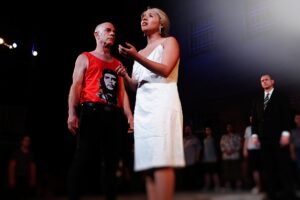
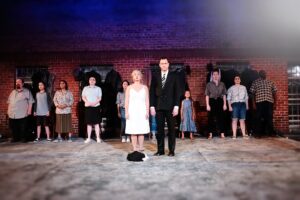
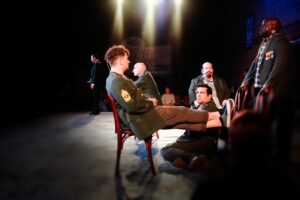

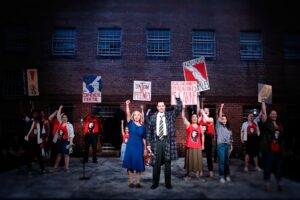
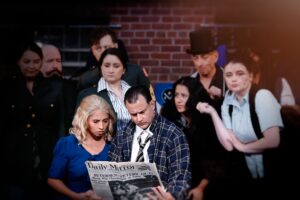
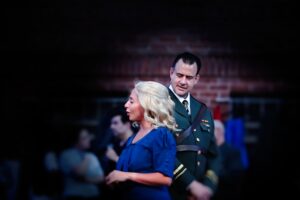
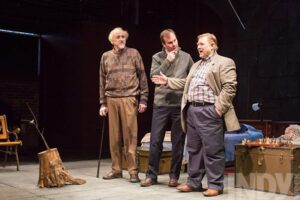
Have a fond or interesting memory of this play you’d like to share with us? We’d love to hear it!
Please Contact Us to Share!
Burning Coal Theatre
(919) 834-4001
224 Polk St., Raleigh NC 27604
Played June 17-27, 2021: Evita
Season 25: (2021-2022)
I and You
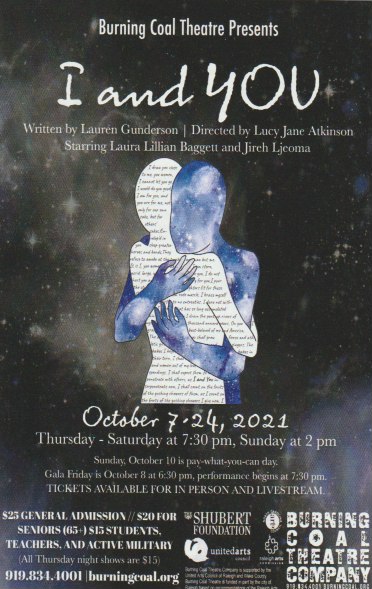
I and You by Laura Gunderson
Dir. Lucy Jane Atkinson
Dates: October 7-21, 2021
Location: Murphey School
The Road to Mecca

The Road to Mecca by Athol Fugard
Dir. Jerome Davis
Dates: December 2-19, 2021
Location: Murphey School
ART
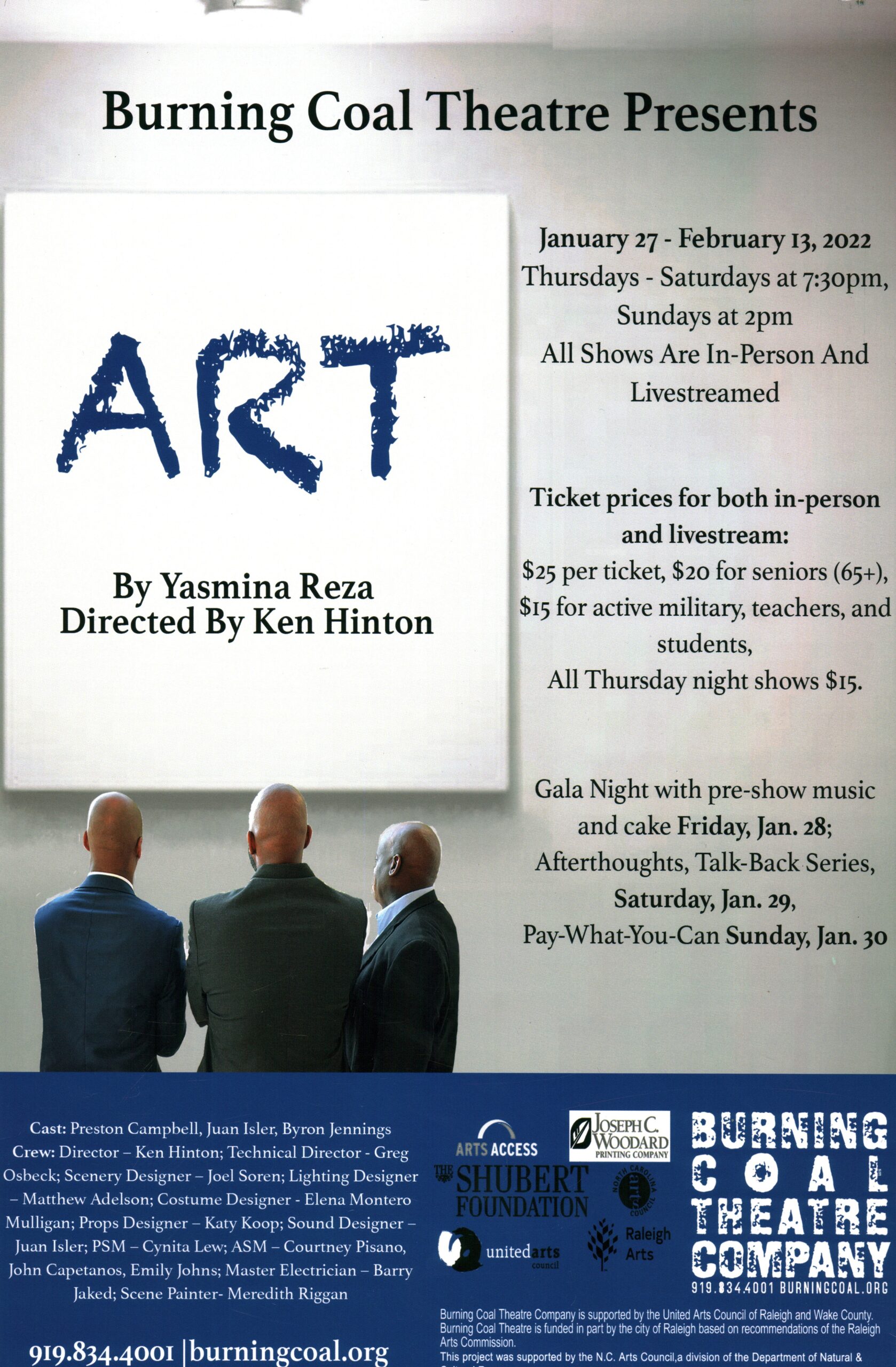
ART by Yasmina Reza
Dir. Ken Hinton
Dates: January 27-February 13, 2022
Location: Murphey School
The Life of Galileo
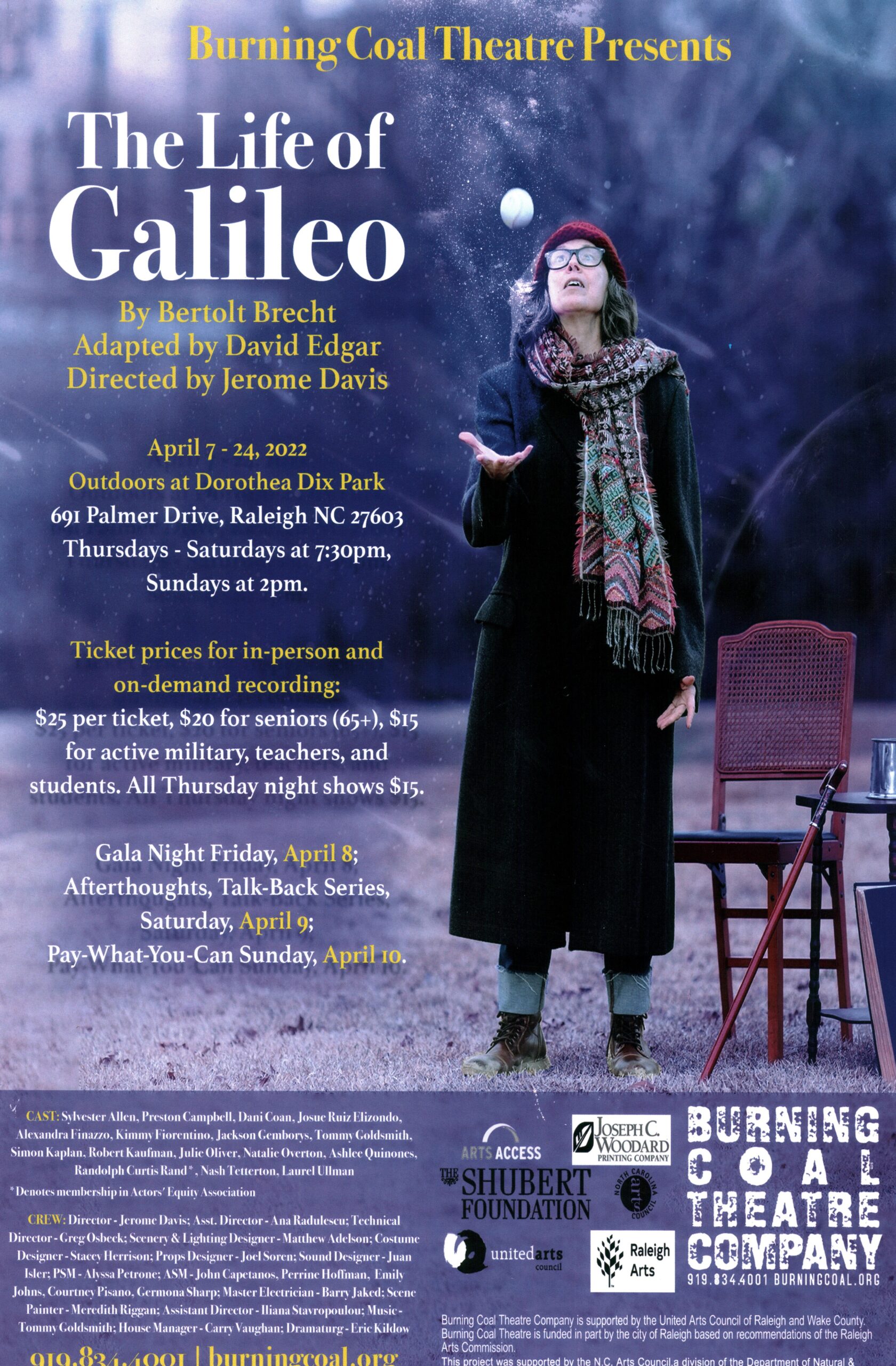
The Life of Galileo by Bertolt Brecht, adpapted by David Edgar
Dir. Jerome Davis
Dates: April 7-24, 2022
Location: Dorothea Dix Park
I and You
I and You by Laura Gunderson
Dir. Lucy Jane Atkinson
Dates: October 7-24, 2021
Location: Warehouse District, Raleigh / The Cockpit, London
Artistic Director’s Notes:
I love this play. I love the idea of starting out our 25th anniversary season with this play.
Pandemic, or no pandemic, we’d be opening with this one! It is such a pure example of storytelling, the act of someone telling someone else what happened. In Lauren Gunderson’s
beautiful, funny and elegiac play, two very young people, unsure of anything, meet and consider the really big questions, as teenagers will often do. And at the top of that list are, of course, the questions “why are we here?” and “what should we do while we are here?’ Those are the
questions asked by every great drama from Oedipus Rex to Hamlet, from Death of a Salesman to Waiting for Godot. The nice thing about this play, I think, is that it does suggest an answer. For a
few decades now we in the theatre have had an idea, collectively, that art is supposed to ask
questions. Full stop. And generally, I agree with that, because after all, the big questions remain
with us because they are difficult, perhaps even unanswerable. If they weren’t, we’d have moved on a long, long time ago. But that doesn’t mean there aren’t answers to consider, along with questions. And when a writer of Mrs. Gunderson’s prominence lands on an answer, then perhaps, to borrow from a past generation’s voice, “attention must be paid.”
Another thing I love about this play is the authenticity of youngsters’ voices. That’s not something you hear much in the performing arts. By the time a writer has reached a level of
prominence that will allow them to get a play or a film made, they have long passed that part of
their lives where they remember what it is like to be a teenager. Lauren remembers the sounds, the interests, the raging terror that exists within the minds of these newly minted people. It is an
age when one is stretching to see how far your reach will extend, where the boundaries are, while
at the same time, terrified at what might be at the end of that reach, and she has found a story
simple enough yet profound enough to encompass both the exhilaration of that search and the
terror that follows you, like a shadow, on that journey. I love this play (did I mention that?) and I
cannot wait to see you see it.
Jerome Davis
Crew:
Stage Manager: Jeremy Vance
Technical Director: Greg Osbeck
Lighting Design: Chris Popowich
Scenery Design: Erin Morales
Props: Elizabeth Newton
Sound Design: Christy Rose
Costume Design: Stacey Herrison
Master Electrician: Barry Jaked
Asst. Director: Carry Vaughan
Asst. Stage Manager: Adam Budlong, John Capetanos, Meg Kessinger
Asst. Lighting Designer: Sydney Fansler
Scenic Charge Artist: Meredith Riggan
Intimacy Coordinator: Jeff A.R. Jones
Video Consultant: David Ray
Streaming Consultant: Alex Procknow
House Manager: Carry Vaughan
Study Guide: Eric Kildow
Costumes Asst.: Natalie Overton:
Asst. Scenic Artist: Cole Train
Cast:
Laura Lillian Baggett Caroline
Jireh Ijeoma – Anthony









Have a fond or interesting memory of this play you’d like to share with us? We’d love to hear it!
Please Contact Us to Share!
Burning Coal Theatre
(919) 834-4001
224 Polk St., Raleigh NC 27604
Played October 7-24, 2021: I and You
The Road to Mecca
The Road to Mecca by Athol Fugard
Dir. Jerome Davis
Dates: December 2-19, 2021
Location: Murphey School
Crew:
Stage Manager: Leslie Castro
Technical Director: Greg Osbeck
Lighting Design: Chris Ppowich
Scenery Design: Erin Morales
Props: Emily Johns
Sound Design: Juan Isler
Costume Design: Elizabeth Huddleston
Master Electrician: Barry Jaked
Asst. Master Electrician: Laura Greenwood
Dialects Coach: Kirby Wahl
Asst. Director: Ana Radulescu
Asst. Stage Manager: Rose Mandese, Emily Johns
Scenic Charge Artist: Meredith Riggan
Video Consultants: Alex Procknow and David Ray
Board Operator: Meg Kissinger
House Manager: Carry Vaughan
Lighting Asst.: Glenn Sappie
Study Guide: Eric Kildow
Asst. Scenic Artist: Barbara Seinfled, Cole Train
Tech Support: Chad Gardner, Davyous Melvin
Cast:
Lenore Field – Miss Helen
Abbe Fralix – Elsa Barlow
Brian Linden – Reverend Marius Byleveld
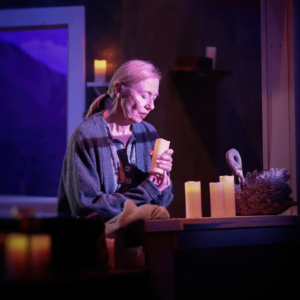
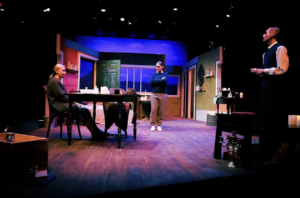
Have a fond or interesting memory of this play you’d like to share with us? We’d love to hear it!
Please Contact Us to Share!
Burning Coal Theatre
(919) 834-4001
224 Polk St., Raleigh NC 27604
Played December 2-19, 2021: The Road to Mecca
ART
ART by Yasmina Reza
Dir. Ken Hinton
Dates: January 27-February 13, 2022
Location: Murphey School
Hello and welcome to 2022. I know everyone is having a bit of a hard time with the vagaries of
this lingering pandemic, inflation spiraling, the continuing criminal misdeeds of those who were sworn to protect and serve, the political machinations that seem to rip us further from each other,
while eternally rewarding those at the top, and the increasing willingness, broadly and openly, of the powerful to say “Yeah, there’s definitely two sets of rules, one for us and one for you.” All of
that seems dour and not the least bit like the set up for a comedy, and yet… I first saw Art not long after its English language premiere. I was taken by its curious sense of the
familiar. In each of the three characters, I somehow saw myself, but at different moments. This is
not common in a play that is built upon archetypes. And while Ms. Reza is French and follows in
Moliere’s path in that each of her characters is a specific comic type, what is unique about Art is that, unlike Moliere, she does not limit a character to the commonly held characteristics one
would associate with their assigned type. Moliere would never have thought to give Arlecchino (the clever servant) any of the character traits of, say, Pantalone (the rich old man). Reza not only has done so, but has done so almost imperceptibly so that the hierarchy that the characters in Art willingly acquiesce to for most of their lives is also the cage that keeps them bound up,
unwillingly to challenge the status quo, and unwilling to see the traits that each shares with the
others. And when that revelation does finally come, through the seemingly innocuous gesture of the purchase of an abstract painting, then the freedom that is afforded them causes a rupture in
their relationships…but also a joyfulness at having finally shed the yoke of character that each has donned over time and then carried throughout their long relationship like an anvil. The slings
slung at one another is done with such mirthfulness that, although hurtful on one level, brings
great relief, I think, as well, and because each of the three men realize that they are finally meeting their true friends, not some artificial versions. That’s why Art is a comedy rather than a
drama or even a tragedy, as it might have been in lesser hands. Now, if we could just get our leaders to break character, we’d be ready for the forward progress that our country and our world so richly and obviously craves,
Until then, we can dream of that
blank canvas.
Jerome Davis
Crew:
Stage Manager: Cynthia Lew
Technical Director: Greg Osbeck
Lighting Design: Matthew Adelson
Scenery Design: Joel Soren
Props: Katy Koop
Sound Design: Juan Isler
Costume Design: Elena Montero Mulligan
Master Electrician: Barry Jaked
Asst. Director: Amelia Lumpkin
Asst. Stage Manager: John Capetanos, Emily Johns, Devious Melvin, Courntey Pisano
Scenic Charge Artist: Meredith Riggan
Video Consultant: David Ray
Streaming Consultant: Pimpila Violette
Lighting Assst.: Laura Greenwood
Asst. Technical Director: Chad Gardner
Study Guide: Eric Kildow
Asst. Scenic Artist: Cole Train
Cast:
Preston Campbell – Serge
Juan Isler – Y van
Byron Jennings – Marc
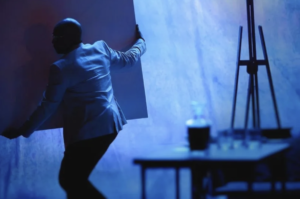
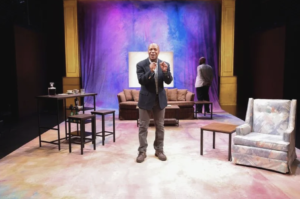
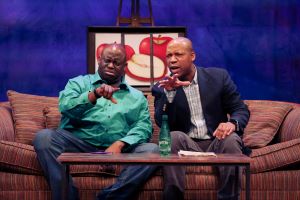
Have a fond or interesting memory of this play you’d like to share with us? We’d love to hear it!
Please Contact Us to Share!
Burning Coal Theatre
(919) 834-4001
224 Polk St., Raleigh NC 27604
Played January 27-February 13, 2022: ART
The L
The Life of Galileo by Bertolt Brecht, adapted by David Edgar
Dir. Jerome Davis
Dates: April 7-24, 2022
Location: Dorothea Dix Park
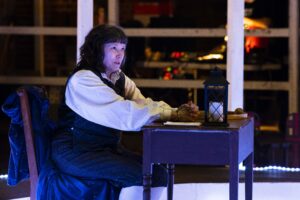
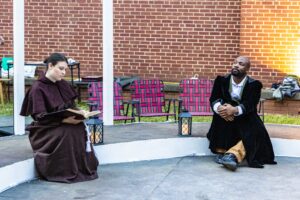
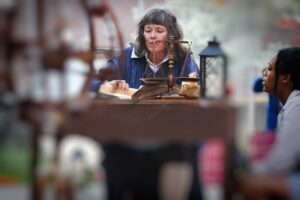
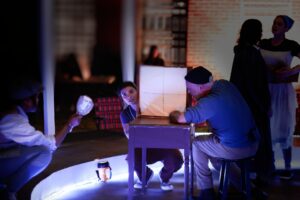
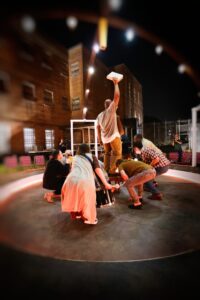
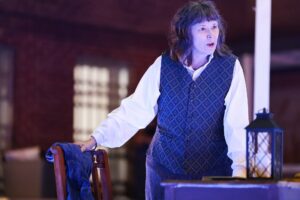

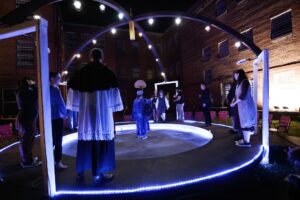
Have a fond or interesting memory of this play you’d like to share with us? We’d love to hear it!
Please Contact Us to Share!
Burning Coal Theatre
(919) 834-4001
224 Polk St., Raleigh NC 27604
Cast
Sylvester Allen
Preston Campbell
Dani Coan
Josue Ruiz Elizondo
Alexandra Finazzo
Kimmy Fiorentino
Jackson Gemborys
Tommy Goldsmith
Simon Kaplan
Robert Kaufman
Julie Oliver
Natlie Overton
Ashlee Quinones
Randolph Curtis Rand
Nash Tetterton
Laurel Ullman
Crew
Director: Jerome Davis
Assistant Director: Ana Radulescu, Iliana Stavropoulou
Technical Director: Greg Osbeck
Scenery & Lighting Designer: Matthew Adelson
Costume Designer: Stacey Herrison
Props Designer: Joel Soren
Sound Designer: Juan Isler
PSM: Alyssa Petrone
ASM: John Capetanos, Perrine Hoffman, Emily Johns, Courtney Pisano, Germona Sharp
Master Electrician: Barry Jaked
Scene Painter: Meredith Riggan
Music: Tommy Goldsmith
House Manager: Carry Vaughan
Dramaturg: Eric Kildow
Played April 7-24, 2022: The Life of Galileo
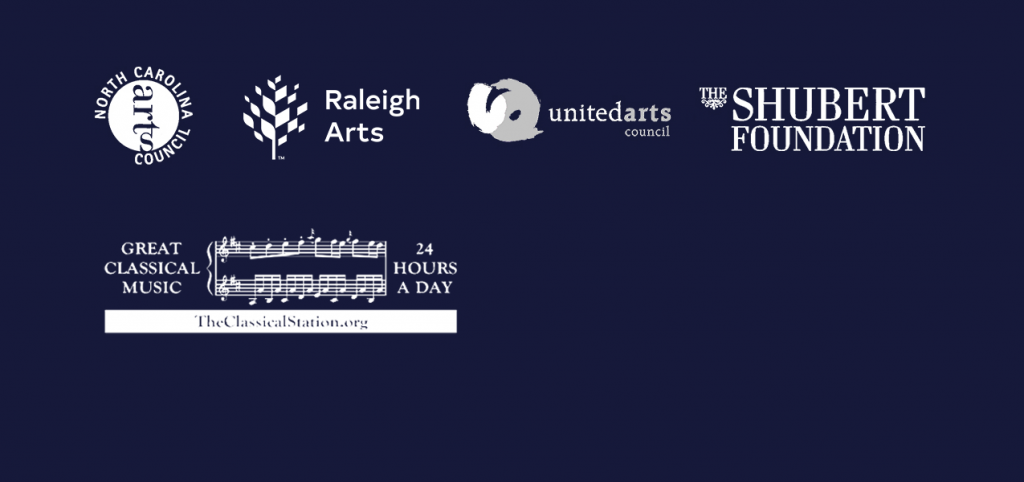
Thank you. Your being here and your support makes it possible to bring live, inclusive, innovative theatre to Downtown Raleigh, NC, and beyond.
Burning Coal Theatre Company is funded in part by the City of Raleigh based on recommendations of the Raleigh Arts Commission. Burning Coal Theatre Company is supported by the United Arts Council of Raleigh and Wake County.
Burning Coal Theatre | (919) 834-4001 | info@burningcoal.org | 224 Polk St., Raleigh NC 27604
Copyright © 2021 Burning Coal Theatre Company | All Rights Reserved | Home
